 21/03/2009 16:09 21/03/2009 16:09 |
|
| | | OFFLINE | Post: 3.702 | Registrato il: 23/11/2005
| Utente Master | |
|
OREMUS PRO PONTEFICE NOSTRO
The Holy Father requests the prayers of all the faithful so that the Lord may illumine the road for the Church. May the commitment of Pastors and the faithful grow, in support of the delicate and weighty mission of the Successor of the Apostle Peter as 'the guardian of unity' in the Church.
- Vatican Note, Feb. 4, 2009
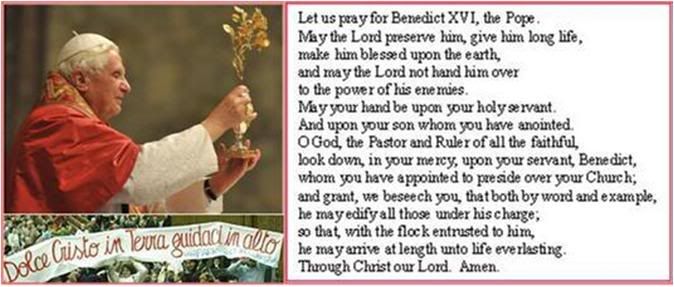
 See preceding page for earlier stories posted today including the Pope's Mas with the bishops,
See preceding page for earlier stories posted today including the Pope's Mas with the bishops,
clergy and religious of Luanda - with terrific photos - and the full text of his homily;
plus some commentaries. .

 The headline on this article is really stupid but some of the content is quite interesting. The Western press can't pretend that the pope's welcome in Africa has been anything but rapturous.
Pope condemns sorcery, urges Angolans to convert
The headline on this article is really stupid but some of the content is quite interesting. The Western press can't pretend that the pope's welcome in Africa has been anything but rapturous.
Pope condemns sorcery, urges Angolans to convert
By VICTOR L. SIMPSON
March 21, 2009
LUANDA, Angola (AP) — Pope Benedict XVI appealed to the Catholics of Angola on Saturday to reach out to and convert believers in witchcraft who feel threatened by "spirits" and "evil powers" of sorcery.
On his first pilgrimage to Africa, the pope drew on the more than 500 years of Roman Catholicism in Angola, saying that Christianity was a bridge between the local peoples and the Portuguese settlers.
"In today's Angola," the pope said in a homily at Mass, "Catholics should offer the message of Christ to the many who live in the fear of spirits, of evil powers by whom they feel threatened, disoriented, even reaching the point of condemning street children and even the most elderly because — they say — they are sorcerers."
In Africa, some churchgoing Catholics also follow traditional animist religions and consult medicine men and diviners who are condemned by the church. People accused of sorcery or of being possessed by evil powers sometimes are killed by fearful mobs.
Benedict counseled Catholics to "live peacefully" with animists and other nonbelievers and urged Angolans to be the "new missionaries" to bring people who believe in sorcery to Christ.
Eighty percent of Angola's 16 million people are Christian, about 65 percent Catholic.
Benedict spoke at a Mass at the capital's blue-domed St. Paul's Church, where light streamed through stained glass windows onto veiled nuns and priests and bishops resplendent in white and lilac robes.
Before the invitation-only Mass for nuns and priests, Benedict was welcomed by a huge crowd.
Children screamed their excitement and held up cell phones to take photographs of the 81-year-old pontiff. Young girls prostrated themselves before him in a sea of pink veils.
People chanted and swayed to drumbeats and the rhythm of hymns in this tropical seaside capital. Many women wrapped their waists in cloth printed with photographs of the pope's face.
The pope lovingly caressed the faces of children and sketched the cross on their foreheads.
Security was unusually tight, with military sharpshooters atop buildings in the capital. The National Police said they have deployed 10,000 officers. Security agents blocked cell phones in the church, apparently by sending a signal.
Inside, veiled nuns and bishops resplendent in white robes with cerise belts and skull caps celebrated Mass with Benedict, who arrived in Luanda on Friday on the second leg of his tour of the continent with the fastest growing Catholic population in the world.
"This is a very emotional day for me, my first time to get a Papal blessing," said Sister Iliria Olivera, from Oaxaca in Mexico, among hundreds of foreign missionaries in the church.
Olivera for nine years has been working with her Sisters of the Divine Pastor, teaching children and running a maternal health clinic outside Luanda.
After the Mass, the pope mounted a podium to bless the frenzied crowd of faithful who cheered him, crying out "Viva ao papa! Viva!"
Tens of thousands of people lined the streets to get the benediction of the pope, who waved signs of the cross from his popemobile as he processed through the capital.
On Friday, Benedict lamented what he called strains on the traditional African family, condemning sexual violence against women and chiding countries that have approved abortion.
Earlier in the weeklong trip, Benedict drew criticism from aid agencies and some European governments when he said that condoms were not the answer to Africa's severe AIDS epidemic, suggesting that sexual behavior was the issue.
In his remarks to diplomats, Benedict also called for a "conversion of hearts" to rid Angola and the rest of Africa of corruption.
Critics say last year's elections, which were swept by dos Santos' party, were marred by fraud and corruption. Dos Santos has been in power for 30 years.
In his welcome speech after arriving from Cameroon on Friday, Benedict referred to Angola's poverty as well as its rich natural resources, saying the multitude of poor Angolans must not be forgotten.
Angola is rich in diamonds and oil, but war and mismanagement have left most of its people in poverty.
He referred to his own childhood growing up in Nazi Germany, saying he had known war and national divisions and was keenly aware that dialogue was a way of overcoming "every form of conflict and tension and making every nation, including your own, into a house of peace and fraternity."
Angola was lacerated by a civil war that started with its 1975 independence and ended in 2002. Its history as a former Portuguese colony has given the country Christian roots.
President Eduardo dos Santos, who welcomed the pope at the airport Friday, said his government has good relations with the Vatican and underlined the strong role the church plays in the country's recovery from nearly three decades of war.
In a message of welcome published in the local press Saturday, he said "Today, the signs of reconstruction of Angola are already visible and we can say that the benefits of peace can be felt in the life of each citizen."
[Modificato da TERESA BENEDETTA 21/03/2009 18:06] |
|
 21/03/2009 18:28 21/03/2009 18:28 |
|
| | | OFFLINE | | Post: 16.906 | Registrato il: 28/08/2005
| Utente Gold | |
|

Am impromptu 'ceremony' outside the Church of St. Paul today, when the Holy Father arrived to celebrate Mass, is a fitting prelude to his meeting later today wioth the youth of Angola at the Dos Coqueiros Stadium. (The coverage has just finished and I am awaiting the photos and the text of his address to THE young people.)
NB: The cloth laid out on the pavement in the first picture represents a flower.
P.S. That's no 'cloth' - Those are all children draped in green and pink cloth, respectively, who lay down on the pavement to form a 'living rose' for the Holy Father. They are the ones he greetd so affectionately right after.]
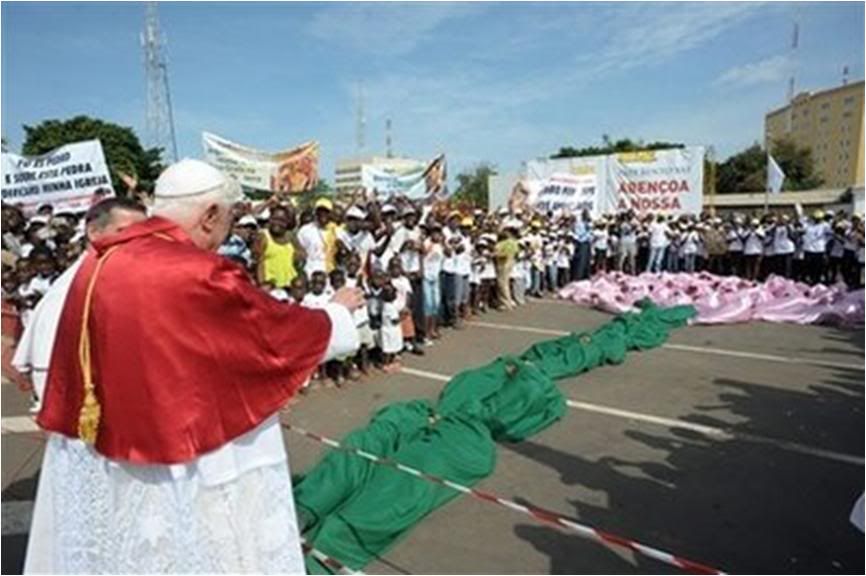
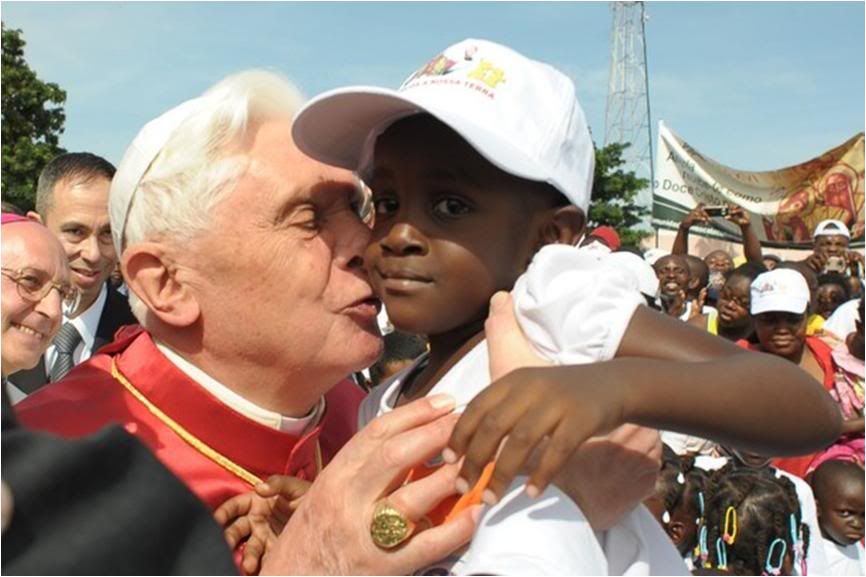
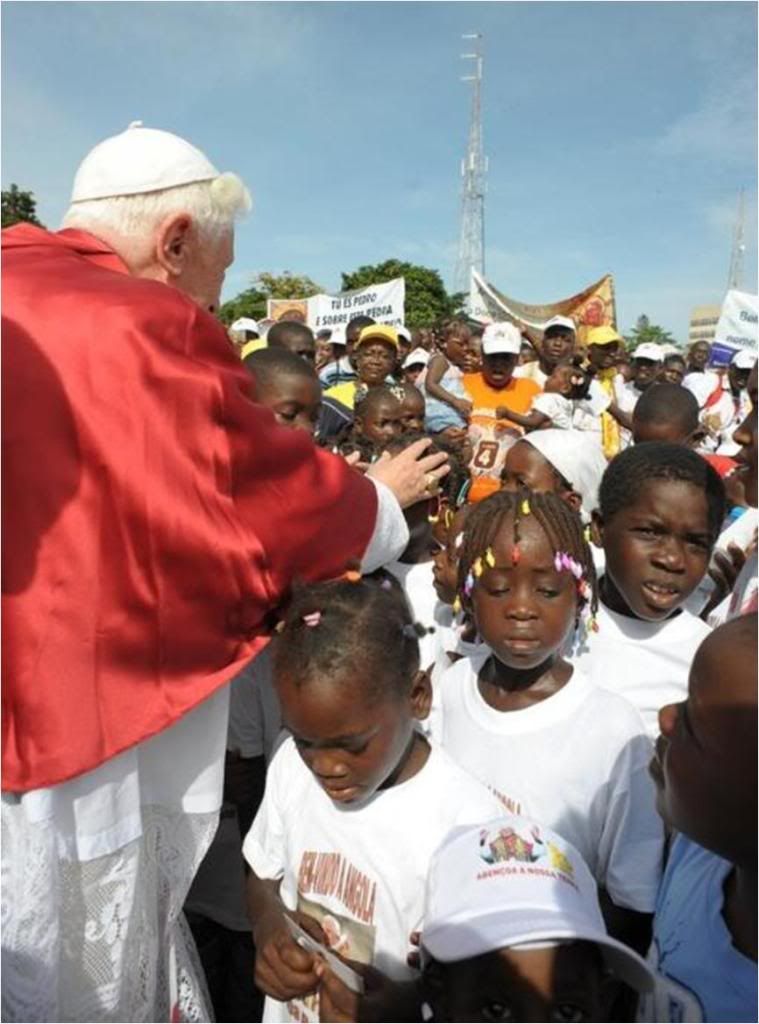 [Modificato da TERESA BENEDETTA 22/03/2009 16:28] |
 21/03/2009 19:12 21/03/2009 19:12 |
|
| | | OFFLINE | | Post: 16.907 | Registrato il: 28/08/2005
| Utente Gold | |
|
 DAY 5 - ENCOUNTER WITH THE YOUTH
DAY 5 - ENCOUNTER WITH THE YOUTH
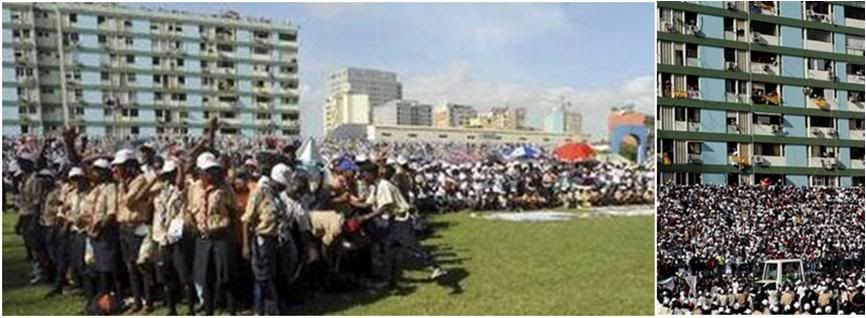
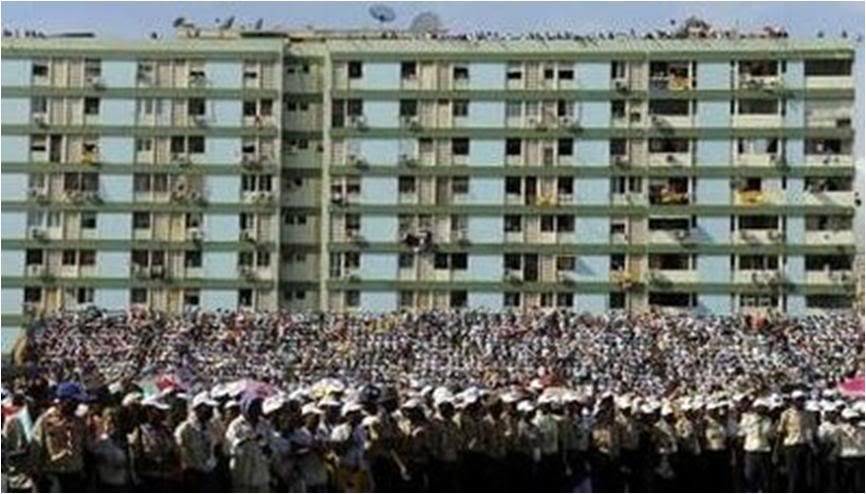
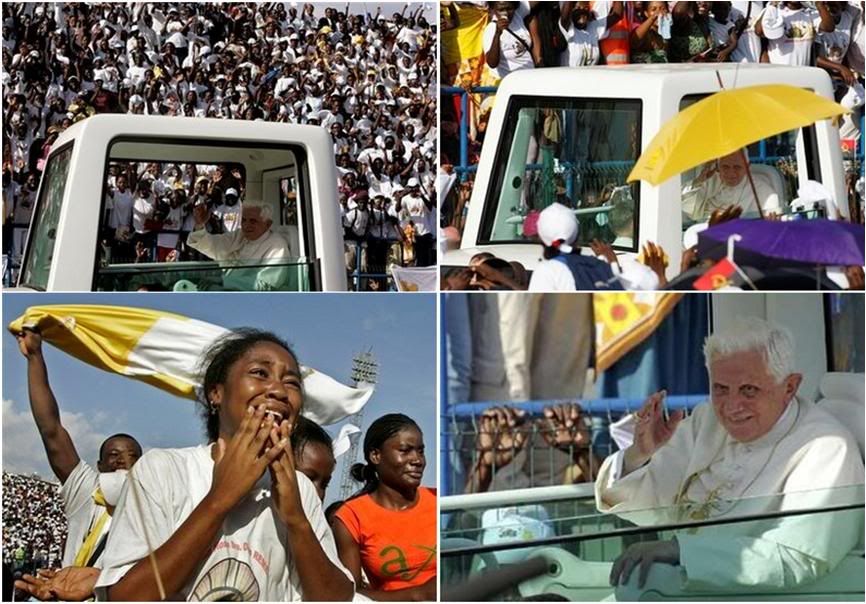
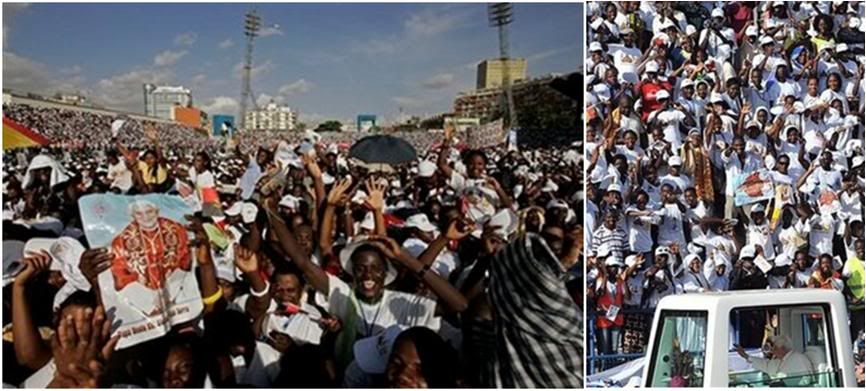
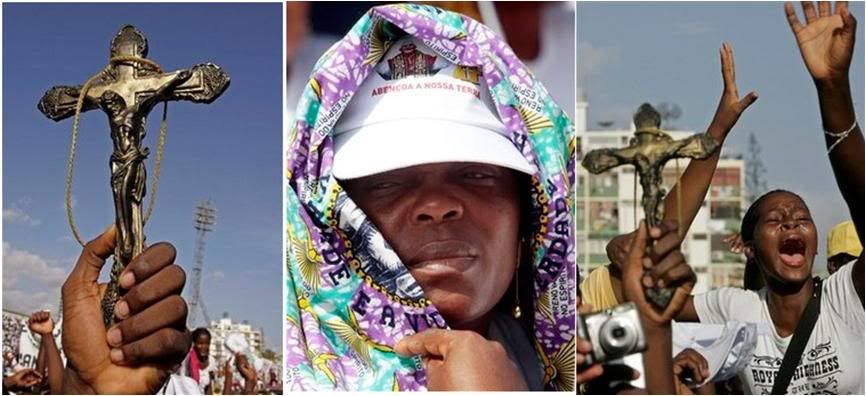 What a great card-flip preeentation! Somewhere, a photographer will have shot it at the right time -
What a great card-flip preeentation! Somewhere, a photographer will have shot it at the right time -
this one was shot a moment too soon...so there's a vertical row down the face that hasn't fully flipped its cards yet....
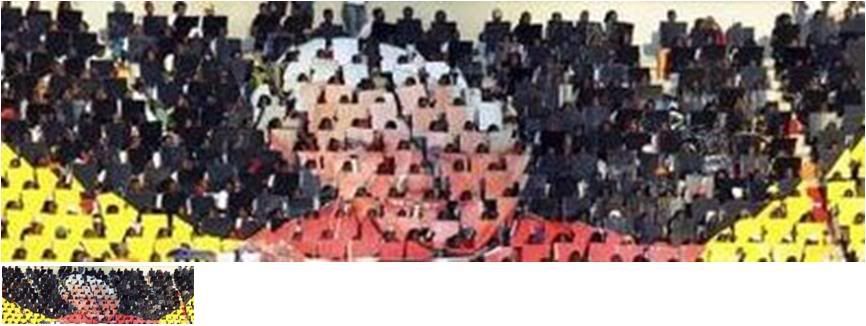
THE POPE'S ADDRESS
TO THE YOUTH OF ANGOLA
Dear Friends,
You have come here in great numbers to be with the Successor of Peter, and you represent so many other young people who are one with us in spirit. You have come to join me in proclaiming openly the joy of our faith in Jesus Christ, and in renewing your commitment to be his faithful disciples in our time.
A meeting much like this took place here in Luanda on June 7, 1992 with our beloved Pope John Paul II. Today another Pope stands before you: with a different appearance, but with the same love in his heart, and he embraces all of you in Jesus Christ, who is "the same yesterday, today and forever" (Heb 13:8).
First of all I want to thank you for this celebration which you have planned for me, for the festive atmosphere which you yourselves generate, for your presence and for your joy.
I cordially greet my brother Bishops and priests and all those who are engaged in youth ministry. I likewise greet with gratitude all who have prepared this event, especially the Bishops' Commission for Young People and Vocations, and its President, Bishop Kanda Almeida, whom I thank for his warm words of welcome.
I greet all the young people present, Catholics and others, who are looking for an answer to their questions and difficulties. Some of these have been expressed by your representatives, and I have listened to them with gratitude and appreciation. The embrace I exchanged with them is, naturally, an embrace which I offer to all of you.
Meeting young people is good for everyone! You may have your share of difficulties, but you are filled with great hope, great enthusiasm and a great desire to make a new beginning.
My young friends, you hold within yourselves the power to shape the future. I encourage you to look to that future through the eyes of the Apostle John.
Saint John tells us: "I saw a new Heaven and a new earth ... and I saw the holy city, the new Jerusalem, coming down out of Heaven, from God, prepared as a bride adorned for her husband; and I heard a loud voice from the throne saying, 'Behold the dwelling of God is with men'" (Rev 21:1-3).
Dear young people, God makes all the difference. His special presence among us begins with his easy intimacy with the first couple in the garden of Eden; it continues with the divine glory which shone forth from the Tent of Meeting in the midst of the People of Israel during their journey through the desert, and it culminates in the incarnation of the Son of God who became inseparably one with humanity in Jesus Christ.
Jesus himself traversed the desert of our humanity and, passing beyond death, he rose from the dead and now draws all humanity with himself towards God. Jesus is no longer confined to a particular place and time. His Spirit, the Holy Spirit, flows forth from him, enters our hearts and thus joins us to him, and with him to the Father -- to the God who is one and three.
Yes, my friends! God makes all the difference ... and more! God changes us; he makes us new! This is what he has promised: "Behold, I make all things new" (Rev 21:5).
It is true! The Apostle Paul tells us: "If anyone is in Christ, he is a new creation; the old has passed away, behold the new has come. All this is from God, who through Christ reconciled himself to us" (2 Cor 5:17-18).
In ascending to Heaven and entering eternity, Jesus Christ has become the Lord of all ages. So he can walk with us as a friend in the present, carrying in his hand the book of our days.
In his hand he also holds the past, the foundation and source of our life. He also carefully holds the future, allowing us to catch a glimpse of the most beautiful dawn we will ever see: the dawn that radiates from him, the dawn of the Resurrection.
God is the future of a new humanity, which is anticipated in his Church. When you have a chance, take time to read the Church's history.
You will find that the Church does not grow old with the passing of the years. Rather, she grows younger, for she is journeying towards her Lord, day by day drawing nearer to the one true fountain overflowing with youthfulness, rebirth, the power of life.
Dear young people, the future is God. As we have just heard, "he will wipe away every tear from their eyes, and death shall be no more; neither shall there be mourning, nor crying nor pain any more, for the former things have passed away" (Rev 21:4).
At present though, and even in our midst, I see some of the many thousands of young Angolans who have been maimed or disabled as a result of the war and the landmines.
I think of the countless tears that have been shed for the loss of your relatives and friends. It is not hard to imagine the dark clouds that still veil the horizon of your fondest hopes and dreams.
In your hearts I see doubt, a doubt which you have expressed to me today. You are saying: "Here is what we have. There is no visible sign of the things you are talking about! The promise is backed by God's word -- and we believe it -- but when will God arise and renew all things?"
Jesus'S answer is the one he gave to his disciples: "Let not your hearts be troubled. Believe in God. Believe also in me. In my Father's house there are many rooms; if it were not so, would I have told you that I go to prepare a place for you?" (Jn 14:1-2).
But you persist, dear young people: "Yes! But when will this happen?" The Apostles asked Jesus a similar question, and his answer was: "It is not for you to know times or seasons which the Father has fixed by his own authority. But you shall receive power when the Holy Spirit has come upon you; and you shall be my witnesses ... to the ends of the earth" (Acts 1:7-8).
See how Jesus does not leave us without an answer; he tells us one thing very clearly: renewal starts from within; you will receive a power from on high. The power to shape the future is within you.
It is within you, but how? Just as life exists within a seed. That is how Jesus explained it at a critical juncture in his ministry. The beginning of his ministry was accompanied by great enthusiasm.
People saw the sick healed, demons cast out, the Gospel proclaimed, but otherwise the world had not changed: the Romans remained in power and everyday life continued to be hard, despite those miracles and those beautiful words.
People's enthusiasm was waning so much that even some of his disciples had left the Master (cf. Jn 6:66) who preached but did not change the world. Everyone was asking: deep down, what value does this message have? What has this prophet of God brought us?
It was then that Jesus spoke about the sower who sows in the field of the world, and he explained that the seed is his word (Mk 4:3-20) and his miracles of healing. These are so few in comparison to the immense needs and demands of everyday life.
And yet, deep within the seed, the future is already present, since the seed contains tomorrow's bread, tomorrow's life. The seed seems almost nothing. But it is the presence of the future, the promise already present. When it falls on good soil, it produces fruit, thirty, sixty and even a hundredfold.
My dear friends, you are a seed which God has sown in the world, a seed that contains power from on high, the power of the Holy Spirit. And yet, the only way to pass from the promise of life to actually bearing fruit is to give your lives in love, to die for love.
Jesus himself said: "Unless a grain of wheat falls to the earth and dies, it remains alone; but if it dies, it bears much fruit. He who loves his life loses it, and he who hates his life in this world will keep it for eternal life" (Jn 12:24-25).
This is what Jesus said, and this is how he acted. His crucifixion seems like complete failure, but it is not! Jesus, in the power of "the eternal Spirit, offered himself without blemish to God" (Heb 9:14). Thus, once he fell to the earth, he could bear fruit in every time and place.
In your midst you have the new Bread, the Bread of future life, the Most Holy Eucharist, which nourishes us and pours out the life of the Trinity into the hearts of all people.
Dear young people, as seeds filled with the power of the same eternal Spirit, sprout up before the warmth of the Eucharist, in which the Lord's testament is fulfilled: he gives himself to us and we respond by giving ourselves to others, for love of him.
This is the way that leads to life; it can be followed only by maintaining a constant dialogue with the Lord and among yourselves.
The dominant societal culture is not helping you to live by Jesus' word or to practise the self-giving to which he calls you in accordance with the Father's plan.
Yet, dear friends, you have the power within you, just as it was in Jesus when he said: "the Father who dwells in me does his works... he who believes in me, will also do the works that I do; and he will do greater works than these, because I go to the Father" (Jn 14:10,12).
So do not be afraid to make definitive decisions. You do not lack generosity -- that I know! But the idea of risking a lifelong commitment, whether in marriage or in a life of special consecration, can be daunting.
You might think: "The world is in constant flux and life is full of possibilities. Can I make a life-long commitment now, without knowing what unforeseen events lie in store for me? By making a definitive decision, would I not be risking my freedom and tying my own hands?"
These are the doubts you feel, and today's individualistic and hedonist culture aggravates them. Yet when young people avoid decisions, there is a risk of never attaining to full maturity!
I say to you: Take courage! Dare to make definitive decisions, because in reality these are the only decisions which do not destroy your freedom, but guide it in the right direction, enabling you to move forward and attain something worthwhile in life.
There is no doubt about it: life is worthwhile only if you take courage and are ready for adventure, if you trust in the Lord who will never abandon you.
Young people of Angola, unleash the power of the Holy Spirit within you, the power from on high! Trusting in this power, like Jesus, risk taking a leap and making a definitive decision. Give life a chance!
In this way islands, oases and great stretches of Christian culture will spring up in your midst, and bring to light that "holy city coming down out of Heaven, from God, prepared as a bride adorned for her husband".
This is the life worthy of being lived, and I commend it to you from my heart. May God bless the young people of Angola!
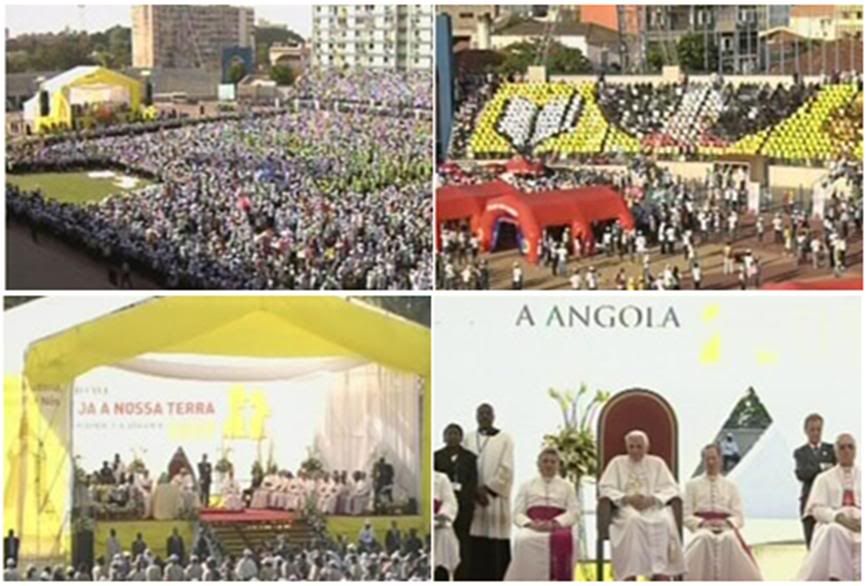
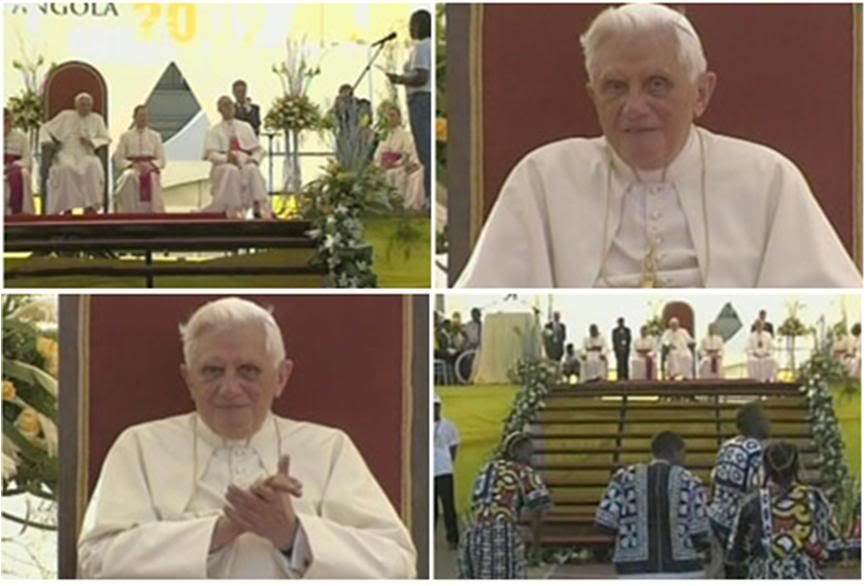
TOO BAD VATICAN RADIO RETIRED FOR THE NIGHT WITHOUT POSTING THE TEXT OF THE POPE'S ADDRESS TO THE YOUTH - ONE OF THE MOST BEAUTIFUL AND MOVING ON THIS TRIP. I CAUGHT HIS ADDRESS BUT NOT THE PRESENTATION BY THE YOUNG PEOPLE BEFORE THAT.
But I doubt if anything coulld have been more beautiful than the last number - performed by a wheelchair-bound landmine victim with a beautiful baritone. He sang a really lovely song about 'my friend Jesus- over whom I weep, but with tears of joy, not sorrow'. It was composed in that melodic plaintive Portuguese song form called the fado. I was in tears....
3/22/09
P.S. The Sunday Mass and Angelus is over and done with, but Vatican Radio has failed its 'duty'! Still no address to the youth - I picked up the above from ZENIT - much less today's homily....
BTW, while re-paragraphing the address [breaking up the long text blocks to make it easier to read and to pick out the essence] in its English translation, I was moved all over by the beautiful way the Holy Father expressed his reflections in such simple language.
Something that struck me for the firt time - how strange I never thought of it before! - as I was listening to him yesterday was what he said about what we should expect of our faith: that even when Jesus walked the earth, in Palestine, things did not change materially.
People saw the sick healed, demons cast out, the Gospel proclaimed, but otherwise the world had not changed: the Romans remained in power and everyday life continued to be hard, despite those miracles and those beautiful words.
How he present's Jesus's answer to the obvious human question, 'Then what do we get from God?', is just so beautiful that I can imagine what impact it would have had on me if I had heard someone speak to me like that when I was a teenager, judging from the impact it has on me now in ripe middle age.
What a catechist! What a teacher! What a saint!
[Modificato da TERESA BENEDETTA 28/03/2009 23:12] |
 21/03/2009 22:02 21/03/2009 22:02 |
|
| | | OFFLINE | Post: 3.703 | Registrato il: 23/11/2005
| Utente Master | |
|
Young Angolans pack stadium to see pope
March 21, 2009
LUANDA (AFP) — Pope Benedict XVI won a rousing reception Saturday as he spoke to more than 30,000 Angolan youths in a Luanda stadium, hoping to revitalise their faith in a nation where evangelicals are making in-roads.
Tens of thousands of young people, including mothers carrying babies, packed into the Stadio dos Coqueiros, filling the stands and the field as music blared from the stage ahead of the pope's appearance.
Thousands more waited outside in the sweltering heat hoping to get inside, as the crowd chanted "Catholic, Catholic" and "Pope, my friend."
When the 81-year-old pope arrived in the stadium, looking tired but smiling, the crowd on the field surged toward his vehicle in a near stampede as he drove toward the stage.
More than half of Angola's population is under 18, and many bear physical scars of the decades of civil war that left the country one of the most heavily landmined nations on the planet.
Although Angola's economy has boomed since the end of civil war in 2002, two thirds of the population lives on less than two dollars a day -- struggles that the pope addressed directly as he sought to reaffirm faith among the youth.
"I see some of the many thousands of young Angolans who have been maimed or disabled as a result of the war and the landmines. I think of the countless tears that have been shed for the loss of your relatives and friends," he said.
"You may have your share of difficulties, but you are filled with great hope, great enthusiasm and a great desire to make a new beginning. My young friends, you hold within yourselves the power to shape the future," Benedict added.
His visit to Angola is a chance to revitalise the church in a country that is 55 percent Catholic, but where evangelical groups and home-grown sects are gaining popularity.
Earlier in the day at a private Mass, the pope condemned the practice of witchcraft, which has been linked to child abuse and even human sacrifice here.
"So many of them are living in fear of spirits, of malign and threatening powers. In their bewilderment they end up even condemning street children and the elderly as alleged sorcerers," Benedict said.
"Today it is up to you, brothers and sisters, following in the footsteps of those heroic and holy heralds of God, to offer the risen Christ to your fellow citizens," he said to the invitation-only crowd at the morning mass.
The church remains one of the few strong national voices outside of government in Angola, running a radio station in Luanda known for broadcasting dissenting views.
Local Church leaders hope the pope's visit will push Angola's government -- run by the formerly Marxist Movement for the Popular Liberation of Angola -- to allow Radio Ecclesia to broadcast nationwide.
In a speech at President Jose Eduardo dos Santos's residence late Friday, Benedict urged African leaders to allow greater press freedom, as he made a stern call for the continent to do more to fight poverty and corruption.
Dos Santos has ruled Angola for 30 years, and the country is ranked among the most corrupt in the world by Transparency International.
Benedict called on Africa to show "a determination born from the conversion of hearts to excise corruption once and for all."
"Armed with integrity, magnanimity and compassion, you can transform this continent, freeing your people from the scourges of greed, violence and unrest," he said.
Benedict has also sought to reinforce Catholic teachings on social issues, including condoms and abortion, but the Vatican on Saturday softened controversial remarks on abortion, saying the church did not oppose medical care for mothers that results in the unintentional death of the foetus.
|
 21/03/2009 22:30 21/03/2009 22:30 |
|
| | | OFFLINE | Post: 3.704 | Registrato il: 23/11/2005
| Utente Master | |
|
Unbelievably, this story is starting to get posted on several big news sites. I REALLY hope that it gets lots more publicity and the researcher, Dr. Green, doesn't end up getting crucified by the liberal anti-pope, anti-Catholic mob.
Harvard Researcher agrees with Pope on condoms in Africa
Cambridge, Mass., Mar 21, 2009 / 10:11 am (CNA).- Pope Benedict’s recent brief remark against condoms has caused an uproar in the press, but several prominent scientists dedicated to preventing AIDS are defending the Pope, saying he was correct in his analysis. In an interview with CNA, Dr. Edward Green explained that although condoms should work, in theory, they may be “exacerbating the problem” in Africa.
Benedict XVI’s Tuesday comments on condoms were made as part of his explanation of the Church’s two prong approach to fighting AIDS. At one point in his response the Pontiff stressed that AIDS cannot be overcome by advertising slogans and distributing condoms and argued that they “worsen the problem.” The media responded with an avalanche of over 4,000 articles on the subject, calling Benedict a “threat to public health,” and saying that the Catholic Church should “enter the 21st century.”
Senior Harvard Research Scientist for AIDS Prevention, Dr. Edward Green, who is the author of five books, including “Rethinking AIDS Prevention: Learning from Successes in Developing Countries” discussed his support for Pope Benedict XVI’s comments with CNA.
According to Dr. Green, science is finding that the media is actually on the wrong side of the issue. In fact, Green says that not only do condoms not work, but that they may be “exacerbating the problem” in Africa.
“Theoretically, condoms ought to work,” he explained to CNA, “and theoretically, some condom use ought to be better than no condom use, but that’s theoretically.”
Condom proponents often cite the lack of condom education as the main culprit for higher AIDS rates in Africa but Green disagrees.
After spending 25 years promoting condoms for family planning purposes in Africa, he insists that he’s quite familiar with condom promotion. Yet, he claims that “anyone who worked in family planning knew that if you needed to prevent a pregnancy, say the woman will die, you don’t recommend a condom.”
Green recalls that when the AIDS epidemic hit Africa, the “Industry” began using AIDS as a “dual purpose” marketing strategy to get more funding for condom distribution. This, he claims, effectively took “something that was a 2nd or 3rd grade device for avoiding unwanted pregnancies” and turned it into the “best weapon we [had] against AIDS.”
The accepted wisdom in the scientific community, explained Green, is that condoms lower the HIV infection rate, but after numerous studies, researchers have found the opposite to be true. “We just cannot find an association between more condom use and lower HIV reduction rates” in Africa.
Dr. Green found that part of the elusive reason is a phenomenon known as risk compensation or behavioral disinhibition.
“[Risk compensation] is the idea that if somebody is using a certain technology to reduce risk, a phenomenon actually occurs where people are willing to take on greater risk.” The idea can be related to someone that puts on sun block and is willing to stay out in the sun longer because they have added protection. In this case, however, the greater risk is sexual. Because people are willing take on more risk, they may “disproportionally erase” the benefits of condom use, Green said.
Another factor that contributes to ineffective condom use in Africa, is the phenomenon where condoms may be effective on an “individual level,” but not on a “population level.” Green’s research found that “condoms have been effective” in HIV concentrated areas where high risk activities are already being conducted, such as brothels in countries like Thailand.
Claiming to be a liberal himself, Green asserts that promoting Western “liberal ideology” where, “most Africans are conservative when it comes to sexual behavior,” is quite offensive to them. Citing his new book, “Indigenous Theories and Contagious Disease,” Green described Africans as “very religious by global standards” who are offended by “trucks going around where people are dancing to ‘Rock ‘n’ Roll’, tossing out condoms to teenagers and the children of the village.”
Green also noted that there is an ideology called “harm reduction” that is being pushed by many organizations trying to prevent AIDS. The ideology believes that “you can’t change the underlying behavior, that you can’t get people to be faithful, especially Africans,” the HIV specialist explained.
One country, Uganda, recognized these issues and said, “Listen, if you have multiple sex partners, you are going to get AIDS.” What worked in Uganda, a country that has seen a decline by as much as 2/3 in AIDS infections, was that officials realized that even aside from religious and cultural reasons, “no one likes condoms.” Instead of waiting for “American and European advisors to arrive,” Ugandan officials reacted and developed a program that fit their culture; their main message being “stick to one partner or love faithfully.”
However, in 2004, Uganda’s AIDS infection rates began to increase once again, due to an influx of condoms and Western “advice”, Green recalled. Western donors also came to Uganda and said behavioral change doesn’t work and that, “most infections nowadays are among married people.” Green said these claims are “misleading,” pointing out that “married people always have lower HIV infection rates than single or divorced people of the same age group.”
Green’s new book, “AIDS and Ideology,” to be completed in the next few months, will describe the industry in Africa that is “drawing billions of dollars a year promoting condoms, testing, drugs, and treatment of AIDS” and is clearly resistant to the idea that behavioral change is the solution.
Yet the two countries that have the highest infection rate of AIDS in the world, Botswana and Swaziland, have recently launched campaigns to promote fidelity and monogamy, the Harvard researcher said. These countries “have learned the hard way” about the failure of condoms in preventing AIDS, he said, noting that “Botswana has probably had more condom promotion” than any other county on a per capita basis. Green said he had no problem “having condoms as a backup to fidelity-based programs.”
According to Green, the Catholic Church should continue to “do what it is already doing,” avoid “arguing about the diameter of viruses” and cite scientific evidence in connection with scripture and moral theology.
|
 22/03/2009 00:50 22/03/2009 00:50 |
|
| | | OFFLINE | Post: 3.705 | Registrato il: 23/11/2005
| Utente Master | |
|
An earlier interview with Dr. Green
From Saint Peter’s Square to Harvard Square
Media coverage of papal comments on AIDS in Africa is March madness.
By Kathryn Jean Lopez, Editor
National Review Online
March 19, 2009
‘We have found no consistent associations between condom use and lower HIV-infection rates, which, 25 years into the pandemic, we should be seeing if this intervention was working.”
So notes Edward C. Green, director of the AIDS Prevention Research Project at the Harvard Center for Population and Development Studies, in response to papal press comments en route to Africa this week.
Benedict XVI said, in response to a French reporter’s question asking him to defend the Church’s position on fighting the spread of AIDS, characterized by the reporter as “frequently considered unrealistic and ineffective”:
I would say that this problem of AIDS cannot be overcome with advertising slogans. If the soul is lacking, if Africans do not help one another, the scourge cannot be resolved by distributing condoms; quite the contrary, we risk worsening the problem. The solution can only come through a twofold commitment: firstly, the humanization of sexuality, in other words a spiritual and human renewal bringing a new way of behaving towards one another; and secondly, true friendship, above all with those who are suffering, a readiness — even through personal sacrifice — to be present with those who suffer. And these are the factors that help and bring visible progress.
“ The pope is correct,” Green told National Review Online Wednesday, “or put it a better way, the best evidence we have supports the pope’s comments. He stresses that “condoms have been proven to not be effective at the ‘level of population.’”
“There is,” Green adds, “a consistent association shown by our best studies, including the U.S.-funded ‘Demographic Health Surveys,’ between greater availability and use of condoms and higher (not lower) HIV-infection rates. This may be due in part to a phenomenon known as risk compensation, meaning that when one uses a risk-reduction ‘technology’ such as condoms, one often loses the benefit (reduction in risk) by ‘compensating’ or taking greater chances than one would take without the risk-reduction technology.”
Green added: “I also noticed that the pope said ‘monogamy’ was the best single answer to African AIDS, rather than ‘abstinence.’ The best and latest empirical evidence indeed shows that reduction in multiple and concurrent sexual partners is the most important single behavior change associated with reduction in HIV-infection rates (the other major factor is male circumcision).”
And while, as Travis Kavulla writes from Kenya today, the international media will ignore all sorts of fascinating new stories about church and civilizational growth in favor of a sexier, albeit way-too-familiar storyline, Green has some encouraging news: The pope is not alone. “More and more AIDS experts are coming to accept the above. The two countries with the worst HIV epidemics, Swaziland and Botswana, have both launched campaigns to discourage multiple and concurrent partners, and to encourage fidelity.”
The pope added during that Q&A, “I would say that our double effort is to renew the human person internally, to give spiritual and human strength to a way of behaving that is just towards our own body and the other person’s body; and this capacity of suffering with those who suffer, to remain present in trying situations.”
We need to, in other words, treat people as people. Reason with them and show them there is a better way to live, respectful of themselves and others. It’s a common-sense message that isn’t madness whether you’re in Africa or dealing with hormonal American teenagers. It’s a hard message to hear over the same-old silly debates, parodies, and dismissals. But it’s one that is based on real life—and acknowledged not just in Saint Peter’s Square but in Harvard Square.
— Kathryn Jean Lopez is editor of National Review Online.
 I, too, believe that all these articles on the side of the right thing and established facts shoudl be given as much play as possible, so I am glad that Kathryn Lopez's article has been posted here. LORI also posted it yesterday on this thread right after I posted Fr. Cervellera's article on the subject in AsiaNews. But please do not take back this post. The more exposure the story gets, the better.
I, too, believe that all these articles on the side of the right thing and established facts shoudl be given as much play as possible, so I am glad that Kathryn Lopez's article has been posted here. LORI also posted it yesterday on this thread right after I posted Fr. Cervellera's article on the subject in AsiaNews. But please do not take back this post. The more exposure the story gets, the better.
TERESA
[Modificato da TERESA BENEDETTA 28/03/2009 23:16] |
 22/03/2009 00:58 22/03/2009 00:58 |
|
| | | OFFLINE | | Post: 16.908 | Registrato il: 28/08/2005
| Utente Gold | |
|
 Angolan authorities managed to keep this story well under wraps until after the Pope's event - there was no hint at all in the coverage I watched that anything had happened earlier! This is so tragic, especially considering the occasion!
Vatican says Pope is 'very upset'
Angolan authorities managed to keep this story well under wraps until after the Pope's event - there was no hint at all in the coverage I watched that anything had happened earlier! This is so tragic, especially considering the occasion!
Vatican says Pope is 'very upset'
over 2 deaths in stadium stampede
hours before his meeting with young people
By MICHELLE FAUL

LUANDA, Angola, March 21 (AP) — The Vatican spokesman confirms a deadly stampede broke out at a stadium a few hours before Pope Benedict XVI addressed young people in Angola.
The Rev. Federico Lombardi says the Pope is "very upset" by reports that two people were killed in the crush.
The incident occurred as the stadium was opening its gates to people waiting outside, about four hours before the Pope arrived.
Portuguese news agency LUSA cites an unidentified source at a local hospital as saying a man and a woman were killed, eight others were hospitalized with minor injuries, and 10 were given medical assistance at the site.
An AP reporter saw another stampede break out when the Pope arrived, and at least 20 people were taken away in ambulances.
*********************************************************************
Our prayers go with the victims and their families.
[Modificato da TERESA BENEDETTA 22/03/2009 01:47] |
 22/03/2009 02:27 22/03/2009 02:27 |
|
| | | OFFLINE | | Post: 16.909 | Registrato il: 28/08/2005
| Utente Gold | |
|
 As with the Regensburg lecture, Benedict XVI's articulation of politically incorrect but very obvious realities has led to what might be a very productive discussion of the topic he brings to life - this time, the anti-AIDS campaigns and what really works.
As with the Regensburg lecture, Benedict XVI's articulation of politically incorrect but very obvious realities has led to what might be a very productive discussion of the topic he brings to life - this time, the anti-AIDS campaigns and what really works.
This is a fine piece by a Western writer who apparently has first-hand acquaintance with the African experience. Whoever you are, John Waters, God bless you, and may your tribe increase!
AIDS 'wars' in Africa
distorted by libertarians:
Criticism of the Pope’s position on condoms
reveals a fault line in Western propaganda
by John Waters

March 20, 2009
DRIVING AROUND Uganda in recent years, you could hardly help noticing the government-sponsored advertising hoardings along the highway.
One had a picture of a smiling man in his 60s with the slogan, “Say No to Sugar Daddies”.
Another showed a slightly younger man, and the slogan, “Would you want this man sleeping with your daughter? So why are you sleeping with his?”
The billboards were part of Uganda’s long, successful battle against AIDS, these posters being directed at creating a sexual firebreak between generations.
In the 1980s, Uganda was at the epicentre of the African AIDS catastrophe, but managed to reverse the spread of the disease through an emphasis on cultural adaptation – abstinence, fidelity and some education about condom use.
In Europe and America, however, whenever the subject of AIDS and Africa is mentioned, there is an assumption that condoms are incontrovertibly the sole option.
No sooner had Pope Benedict XVI stepped off the aircraft in Cameroon this week than the western media was again pumping out its partisan propaganda. The pope was reported saying AIDS could not be overcome through the distribution of condoms, “which even aggravates the problems”.
As usual, voices asserted that the battle against AIDS in Africa was all about condoms, with the Catholic position treated as dangerous obscurantism. Benedict, we were told, was “refusing to yield”.
Spokesmen and women for European governments claimed the use of condoms was the vital element in the fight against AIDS. We were told that “even” some priests and nuns working against AIDS believe the pope is wrong.
But for every such voice, there are hundreds of priests, nuns and other anti-AIDS activists in Africa saying the Western obsession with condoms is a distraction. What works is action to change sexual behaviour, and the Catholic Church has long been to the fore in pushing such initiatives.
At the core of the kick-the-Pope argument is a gross absurdity. AIDS was spread in Africa mainly by truck drivers using prostitutes along the arterial highways that string together an otherwise disorderly continent.
The Pope, as well as opposing condoms, is also hostile to prostitution and extra-marital sex, and yet it is implied that those who have been spreading HIV/AIDS through promiscuous behaviour would wear condoms if the Pope told them to do so.
But Pope Benedict is neither a lawmaker nor a policeman. He has the power simply to speak the truth as he has received it and then allow everyone the freedom to decide for themselves.
[They are not simply presuming that if the Pope and the Church say something should not be done, people - even non-Catholics - would listen to him. Many Catholics in the West don't even listen to him and are contemptuous of orthodox traditional Catholic teaching!
Worse than their baseless and convenient-to-ther-argument assumption, they accuse the Church of being responsible for the deaths from AIDS because of its anti-condom policy. Has anybody ever done a breakdown by religion of the victims of AIDS in Africa? How can the Church be responsible for the behavior of non-Catholics?
]When it is convenient for the argument of this sanctimonious condom advocates, then they 'assume' that the Pope's word is followed by everyone. But any other time, they scoff that no one listens to the Pope anyway!
Similarly when they want to associate him, however dubiously, with the Nazis, they make much of his being German. But they conveniently forget, when they accuse him of obscurantism or naivete, that he is a genuine German intellectual, with everything that implies in terms of rigorous, systematic and precise reasoning! Imagine accusing the 'Pope of reason' - and the most prominent intellectual on the world stage today - of naivete or obscurantism!! Unfortunatelky, prejudice and ideology tend to blind their practitioners to their own idiocies.]
Whether the libertarian West likes it or not, much of the evidence in Africa indicates that emphasis on monogamy and sexual continence is what delivers on AIDS.
Uganda many years ago identified the problem as a cultural one relating to sexual promiscuity, with condoms a minor and ambiguous sidebar.
The Government promoted the standard “ABC” approach (abstain, be faithful, use condoms), but condoms did not play a significant part in the early battle against the disease, largely because President Yoweri Museveni believed they offered false hope that the disease could be curbed without a change in sexual behaviour.
Later, under assault from the West, the Ugandan health ministry began giving out about 80 million free condoms a year. But after some batches were found to be defective, the government now distributes far fewer condoms.
In the 25 years since AIDS was first reported in Uganda, broad-based partnerships and effective public education campaigns have contributed to a spectacular decline in the number of people contracting HIV and AIDS.
State-sponsored programmes reduced AIDS prevalence from over 30 per cent to about 6 per cent. Fidelity to a single partner was the dominant message of early HIV prevention campaigns.
Uganda’s first lady Janet Museveni has been a vocal proponent of abstinence approaches, and has been widely criticised by the same people who regularly attack the pope.
In recent years, there has been a slight disimprovement in Uganda’s AIDS situation. External critics, predictably, have blamed abstinence policies, but the facts are not so clear-cut.
Although Western propaganda seeks to fudge this, there is some evidence that condom availability may have diluted the earlier message, causing a shift back to old habits.
Ideally, one might think, abstinence programmes and safe sex strategies should complement each other. But in practice the approaches are mutually incompatible. Once you advocate condom use, you are accepting that abstinence is no longer a persuasive option.
And if you argue, as the Catholic Church does, that promiscuity promotes HIV/AIDS, it would be ludicrous to recommend measures that, implicitly, suggest that this position can be relativised.
This is a complex issue, which certainly cannot be reduced to a simple questions of condoms.
What the world needs is a full and truthful discussion, not bigoted, libertarian propaganda masquerading as reportage.
 I've heard the following fact cited so often in the past few days but I don't know that it has been posted on the Forum yet. I've checked back, and it seems not.
I've heard the following fact cited so often in the past few days but I don't know that it has been posted on the Forum yet. I've checked back, and it seems not.
It's a great argument for those who think that easy availability of condoms necessarily brings down the AIDS infection rate! Though predictably, the reportere does not point out that obvious fact at all. For those who do not live in the USA, MSNBC is a dyed-in-the-wool, true-blue, diehard, unregenerate, ultra-liberal outlet.
HIV/AIDS rate in Washington D.C.
'higher than in West Africa'

NBCWashington.com
March 17, 2009
It's a startling figure.
Nearly 3,000 of every 100,000 people living in the nation's capital have HIV or AIDS, according to a report that will be released by D.C. health officials Monday.
That's a little more than 15,000 people with the disease -- a total that well exceeds the 1 percent threshold for what makes up a "generalized and severe epidemic," according to the 2008 epidemiology report.
" Our rates are higher than West Africa," Shannon L. Hader, director of the District's HIV/AIDS Administration, told The Washington Post. "They're on par with Uganda and some parts of Kenya."
Hader -- who led the Federal Centers for Disease Control and Prevention's work in Zimbabwe -- said every mode of transmission for the virus and the disease is rising, from men having sex with men, and heterosexual and injected drug use -- or, as noted by the study, "the true number of residents currently infected and living with HIV is certainly higher."
More than 4 percent of blacks in the city are known to have HIV, along with almost 2 percent of Latinos and 1.4 percent of whites, according to the Post.
More than three-quarters -- 76 percent -- of the HIV infected are black, 70 percent are men and 70 percent are age 40 and older.
Despite the dire statistics, there was some good news in the District's report, the Post said. More people are getting HIV diagnoses early, while they are still healthy, a result of a policy of routine testing put in place by the city a couple of years ago.
 Against HIV, education
Against HIV, education
wins out over condoms
Translated from
the 3/22/09 issue of

Ten percent of the world's population lives in sub-Saharan Africa - as well as 66 percent of all HIV-infected persons in the world.
Nonetheless. in a few of those countries, there has been a decline in teh infection rate among adults.
The so-called ABC mode, based on a campaign aimed mostly to young people, of sexual abstinence, faithfulness in marriage, and only lastly, the use of condoms, has proven to be effective.
As explained by Filippo Ciencia and Pier Alberto Bertazzi, both physicians, in an article for the online journal ilsussidiario.net, the prevalence of AIDS in Uganda dropped from 15 percent of the population in 1991 to 5 percent in 2991.
The ABC method has been studied with increasing itnerest in recent years and discussed in major scientific journals such as Lancet, Science and British Medical Journal.
Combonian Brother Daniele Giovanni Giusti is a doctor who has had 30 years missionary experience in Uganda. For 20 years, he worked in various hospitals there. In the past 10 years, he has been in charge of coordinating the health services of the Catholic Church in Uganda. He is an eyewitness of what is happening in that African region.
Are condoms the only valid strategy for fighting AIDS in Africa?
Condoms are useful in epidemic situations for use in three particular groups of people: prostitutes, homosexuals and drug addicts. Not in other cases. To say that the use of the condom is the winning strategy in a fullblown epidemic - that is, widespread among the general population) - is misleading.
One should take into account the experience of Uganda, cited by everyone as one of the few victories against the further spread of AIDS. The campaign of sensitization and consciousness-raising there was focused on the ABC approach.
Sexual abstinence was encouraged in adolescents and young people to avoid exposure to the virus. And for those who are already sexually active, faithfulness in a monogamous relation rather than promiscuity. Then the condom, but only for those who cannot follow the first two modalities.
The Ugandan government has supported this campaign despite the many pressures from the outside. And that has helped the campaign succeed.
Those who claim that the results were largely due to condom use are lying. The experience in the field shows the opposite. And the principal reason for the success is proper education on AIDS and motivating behavioral change.
How did the population respond?
We have seen a rise in the age for sexual debut among young people and a reduction of active partners among the sexually active - all resulting in lowering the infection rate. The virus has much less opportunity to be transmitted. Condoms have been used but in an almost ridiculously low rate which has not had any serious effects on the results obtained.
So, in effect, education is the true response to the epidemic?
Yes, if the education transmits a conception of the human being that motivates the renewal. This approach is based on the trust and reasonablenesws of the person. We explain what the risks are, what factors can reduce the risks, and what can eliminate them.
Abstinence takes away the risk of transmission via sexual relations. This is the strongest strategy. If the message given to young people is consistent, it changes their sexual behavior.
Faithfulness in sexual relations reduces the risk. If both partners are faithful to each other, the risk is greatly reduced.
Condoms redice the risk but do not eliminate it.
What is the attitude of the large international agencies who are involved in fighting AIDS?
In the past, the international agencies espouses the line of depending on condoms alone. Today, discreetly, they are changing strategy. Experience in the field has shown that in the countries where the focus has been on condom use, the results - in the general population - have not been as good as those in Uganda .
Propagandizing the condom does not take into account the mentality of the population and how they receive the message.
 Can you handle the condom browbeating?
Can you handle the condom browbeating?
By Russell Shaw

Surprise! Surprise! The Pope said something about sex and the secular culture went bonkers. This has happened periodically for 40-plus years — Pope speaks about sex, secularists gnash their teeth — and chances are good it will go on happening farther into the future than anyone can now see.
The occasion for the uproar this time was something Pope Benedict XVI said March 17 on the plane carrying him and a traveling press corps on a weeklong visit to Africa: “You can’t resolve [the AIDS epidemic] with the distribution of condoms. On the contrary, it increases the problem.”
Without getting bogged down in technical arguments about the safety and efficacy of condoms in fighting AIDS, I’ll only say that, just on the face of it, the Pope was obviously right. After all, if you really want to halt the spread of AIDS, then you have to halt the behavior that causes it to spread. What’s to argue about?
But of course that isn’t really the issue in this controversy. The real explanation for the outburst of secularist fury that greeted Benedict’s remark lies in its implied challenge to secularist dogma.
I mean the dogma that no one ever under any circumstances can be allowed to question the wisdom, excellence, virtue, merit, and all-round good sense of permissive sex.
From that point of view, the beauty of condoms is that they provide a measure of protection against HIV infection, without requiring any further modification of sexual behavior.
Yet the Church does challenge the secularist conventional wisdom about sex. Indeed, it has done so from the start. Sex is a very good thing, it says, but only when and if used within a framework of rational, moral restraint. Otherwise sex is at risk of becoming a destructive force — as in fact has happened in these latter days of Western secularism.
The disastrous consequences of denying this fundamental Christian insight about sex are overwhelmingly apparent today. Yet the secular culture has never chosen to acknowledge them, and — heaven knows! — it isn’t about to do so now.
No doubt the Pope can stand up under the hammering he’s gotten — and can expect to get all over again next time he says something about sex that the secularists don’t like.
The backbone issue doesn’t pertain to him but to us. For we are the ones who have to suffer the sneers directed at us by the entertainers, journalists, and chatty academics of our talking heads culture.
And in fact not all Catholics are able to handle this browbeating. More than 40 years ago, for example, many defections occurred in response to the pronouncement by an earlier Pope — Paul VI — that, as the Church had taught all along, artificial birth control was indeed morally wrong.
Catholic teaching on sexual morality remains a source of scandal for many of the Church’s nominal members — to say nothing of former members — today.
But take courage. Christianity faced an even tougher challenge two millennia ago in the context of the pagan Roman Empire. Then it had less access to the machinery of opinion formation than it does now. Yet the Church not only survived but prevailed, as it has continued to do amid the ups and downs of history ever since.
Survive and prevail, we believe, the faith will keep on doing until history itself comes to an end.
The peculiar secular sexual obsessions of the present day will pass. The understanding of human sexuality proclaimed by the Church will remain. It has the distinct advantage of being true.
Media reports on condoms
and AIDS sre superficial,
Catholic medical fed president says

BARCELONA, Spain, MARCH 19, 2009 (Zenit.org).- The president of the World Federation of the Catholic Medical Associations is asserting that the media got it wrong when reporting on Benedict XVI's latest statement about condoms.
Dr. José María Simón Castellví observed that many recent newspaper articles are portraying the Church as saying that, if a person is to have relations with a prostitute, he must not use a condom.
He noted the superficiality with which some media sources have reported Benedict XVI's press conference Tuesday on the plane en route to Cameroon, when the Pope said that condoms are not the solution for AIDS.
"The Church defends faithfulness, abstinence and monogamy as the best weapons," the president told ZENIT.
However, he said, the media and even some political representatives have accused the Church of promoting AIDS in Africa. Obviously, the Church is not saying that one can have all sorts of promiscuous sexual relations, as long as one does not use a condom, he clarified.
The doctor explained that, to understand what the Church says about condoms, it is necessary to understand what love is. He noted that the Pope himself explained this to journalists, although that passage of his conversation was not cited by most of the media.
Simón added: "A condom is a barrier, but a barrier with limits that many times is crossed. It can be counterproductive, especially in the case of young people, from the point of view of viral transmission.
"We, Catholic doctors, are in favor of scientific knowledge. We do not say things only because of ideological obligations.
"In the same way that we say that adultery in one's thoughts does not transmit a virus but is something evil, we must say that condoms have their dangers, limited barriers."
He illustrated the Church's position by recalling a historical case that was reported by the media.
In 1993 in Yaoundé, Cameroon, he said, the 7th International AIDS Meeting was held with expert doctors and health agents. It was a meeting that brought together some 300 participants.
At the end, a questionnaire was handed out asking the participants if, during the three days of the meeting, they had sexual relations outside of a stable relationship.
Of those questioned, 28% answered yes, and of these, one third said that they had not taken any "precaution" to avoid contamination, the doctor reported.
He asked, "If this happens among people who are 'aware,' what must be the case among ordinary people?"
[Modificato da TERESA BENEDETTA 23/03/2009 15:40] |
 22/03/2009 11:09 22/03/2009 11:09 |
|
| | | OFFLINE | | Post: 16.912 | Registrato il: 28/08/2005
| Utente Gold | |
|
|
 22/03/2009 11:15 22/03/2009 11:15 |
|
| | | OFFLINE | | Post: 16.913 | Registrato il: 28/08/2005
| Utente Gold | |
|
 Missed seeing this item earlier. But I don't know whether to take Cardinal Martino's word.
Missed seeing this item earlier. But I don't know whether to take Cardinal Martino's word.
He has often spoken out of turn in the past.
Papal social encyclical
to come out in May?
By Carol Glatz
Catholic News Service
VATICAN CITY, March 20 (CNS) -- Pope Benedict XVI's first social encyclical is already completed and should be ready for release in early May, said a top Vatican official.
The original aim had been to have the encyclical on social justice issues ready for publication in 2007 to coincide with the 40th anniversary of Pope Paul VI's encyclical on human development, Populorum Progressio (The Progress of Peoples), said Cardinal Renato Martino, president of the Pontifical Council for Justice and Peace.
"Naturally, however, with the research and revisions necessary to create and have a text that would respond to today's current situation, well, it got behind schedule a little bit," he told reporters March 20.
"The encyclical is already ready and we hope it will be published in early May," he said.
He said the new papal encyclical will offer "a beautiful response" to the new realities and the changes that have occurred since the last papal encyclical on Catholic social teaching, Centesimus Annus (The Hundredth Year), was published in 1991 by Pope John Paul II.
Pope Benedict's social encyclical was tentatively titled Caritas in Veritate ("Love in Truth") and will be his third encyclical in four years.
Flying to Cameroon March 17, the Pope said one reason for the encyclical's delay was the need to thoroughly deal with the current global economic crisis.
"We were almost ready to publish it when this crisis erupted and we went back to the text in order to give a more adequate response" and to examine what the church sees as being the real problems underlying the financial crisis, he told reporters on the papal plane.
He said he hoped the encyclical could play a part in helping the world overcome its economic woes.
[Modificato da TERESA BENEDETTA 22/03/2009 11:49] |
 22/03/2009 11:48 22/03/2009 11:48 |
|
| | | OFFLINE | | Post: 16.914 | Registrato il: 28/08/2005
| Utente Gold | |
|
 Day 6 - MASS AND ANGELUS
Day 6 - MASS AND ANGELUS
WITH THE BISHOPS OF SOUTHERN AFRICA
Cimangola Field, Luanda
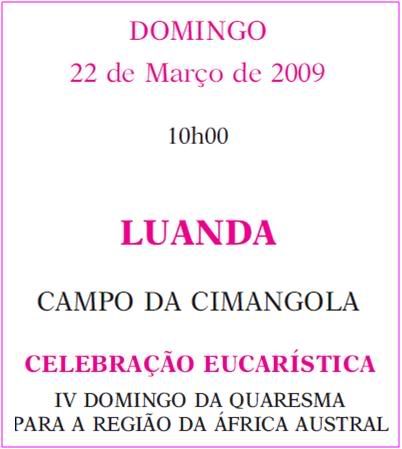  IV Sunday of Lent, Laetare Sunday
IV Sunday of Lent, Laetare Sunday
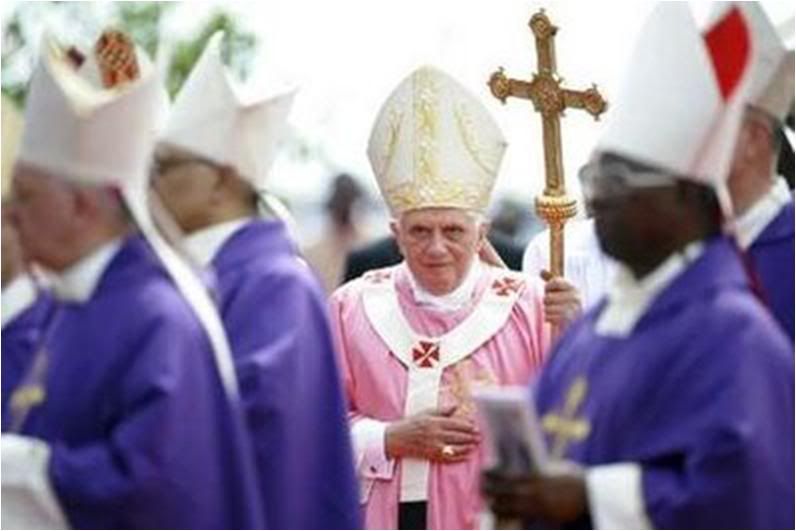 Here's an initial story:
Benedict XVI's call:
Here's an initial story:
Benedict XVI's call:
'Rise up, Africa, and proceed
to construct a better tomorrow'
LUANDA, March 22 (Translated from ANSA) - This was Pope Benedict XVI's call today in his homily at a Mass celebrated with the Bishops of South Africa before a million persons representing not just the Catholics of Angola but also the various tribes and races of southern Africa.
He spoke about the tragedies that have struck this part of the world: "Let us think of the scourge of war, of ferocious results of tribalism and ethnic rivalries, of the greed which corrupts the heart of man", and pointed towards the aim of "a society that is more fraternal and more just, authentically African in its genius and in its values".
The Pontiff also spoke of the insidious morality of our time - of hedonism, drugs, sexual irresponsibility, and the elimination of innocent human lives by abortion".
"To all this," he said, "the Catholic Church should respond, striving above all for internal unity and for unity among the tribes of the continent".
He concluded: "Dear brothers and sisters, look to the future with hope, trust in the promises of God , and live in his truth".
Before the Mass began, the Holy Father expressed his profound sorrow for the death of two girls in a stampede at Dos Coqueiros stadium yesterday when the stadium gates were opened four hours before his encounter with the youth.
He said, "Let us entrust them to Jesus that he may welcome them to his kingdom". He also expressed his bast wishes for those who were injured.
Many of the faithful gathered in Luanda's vast seaside Cimangola field wore white T-shirts with the Pope's image.
 I cannot help wondering why the papal Mass in Yaounde was held in a stadium instead of an open field that could have accommodated more than the 60,000 stadium crowd. The Yaoundians would not have had any problem assembling in a million for such a Mass.
I cannot help wondering why the papal Mass in Yaounde was held in a stadium instead of an open field that could have accommodated more than the 60,000 stadium crowd. The Yaoundians would not have had any problem assembling in a million for such a Mass.
One would have thought security would be more daunting in Angola given its recent history. But perhaps the Pope's security people had their reasons in Yaounde, Or is Yaounde too hilly that it does not have an open space large enough to accommodate a million?
 Speaking of crowds, Western journalists are generally quick to cite 'defibitive' numbers - usually inflated - when they are reporting on demonstrations against something or someome their liberal ideology finds unacceptable, but are hardly ever forthcoming when reporting on Benedict XVI's crowds. Look at this AP headline - after Vatican Radio had announced during the Mass broadcast the police estimate of about a million!
Pope decries African wars
Speaking of crowds, Western journalists are generally quick to cite 'defibitive' numbers - usually inflated - when they are reporting on demonstrations against something or someome their liberal ideology finds unacceptable, but are hardly ever forthcoming when reporting on Benedict XVI's crowds. Look at this AP headline - after Vatican Radio had announced during the Mass broadcast the police estimate of about a million!
Pope decries African wars
at Mass with thousands
By Michelle Faul

LUANDA, Angola, March 22 (AP) – Pope Benedict XVI celebrated Mass Sunday with hundreds of thousands of Angolans and decried the "clouds of evil" over Africa that have spawned war, tribalism and ethnic rivalry that he said condemned poor people to virtual slavery.
The biggest crowd of Benedict's first pilgrimage to Africa turned up in sweltering heat for the open-air service on the outskirts of Angola's seaside capital, Luanda. It was the last major event of his seven-day trip, which ends Monday.
"How true it is that war can destroy everything of value", said Benedict, wearing a pink cape and mopping his brow with a white handkerchief. [Why can't a worldwide news service insist that their journalists at least know the basics about something they are reporting? And if they don't know it, it's the editor's duty to correct it. But just as reporters opine and comment more than they report these days, editors apparently have stoped 'editing' and simply publishing everything their reporters submit without vetting! 'Pink cape' indeed! You'd think he was a matador!]
Evils in Africa have "reduced the poor to slavery and deprived future generations of the resources needed to create a more solid and just society," he said during the Mass under a pink altar in a tent on a huge vacant lot near a cement factory. [No explanation either for why pink today, Letare Sunday!]
Angolans have been enslaved, subjugated and at war almost nonstop since Portuguese colonizers brought the first Catholic missionaries in 1491. Many of the slaves taken to Brazil, for example, came from Angola.
The Catholic Church was an ally of the colonizers who discriminated against the people until independence from Portugal in 1975, when civil war erupted, in part fueled by the country's oil and diamond wealth.
Some 15,000 died, including missionaries, before the war ended in 2002, but its scars still are evident among the many people who lost limbs in one of the most heavily mined countries in the world.
A Marxist revolution also has left scars, though the country's President for 30 years, Eduardo dos Santos, abandoned Communism and improved relations with the Church from the late 1980s.
Critics say last year's massive election victory was marred by fraud and corruption and that the Pope had to be wary of allowing his visit, sponsored by the state, to be seen as legitimizing an authoritarian regime. [Where have they been living all this time? How many states ruled by dictatorial or totalitarian regimes did John Paul II visit in 27 years. The Pope's make apostolic, pastoral trips to their farflung flocks, without any political significance in terms of favoring a regime or not. He is there for the people, not for the government in place!]
The bishops in Angola twice have denounced the government for leaving its people mired in poverty while leaders enrich themselves off oil and diamonds.
Since he arrived on Friday from Cameroon, the Pope has met with dos Santos and spoken out against corruption in Africa, the continent with the fastest-growing Catholic population in the world.
Before Mass Benedict offered his condolences to the families of two 20-year-old women trampled to death in a stampede at a Luanda stadium before a youth event he addressed on Saturday.
He also wished a speedy recovery to some 40 people injured in the crush. Dozens of others collapsed and were treated at the site for heat exhaustion. The Vatican's No. 2 official, Cardinal Tarcisio Pertone, will visit the injured in hospital, said Vatican spokesman the Rev. Federico Lombardi.
People carried parasols and stools amid the hooting cars and motorbikes making their way to see the Pope. Some men hoisted children onto their shoulders and mothers strapped babies to their backs.
Even before he landed in Africa, the Pope provoked protests [And from whom and where? Certainly not in Africa - but by leaving the statement open-ended like that, the reporter implies otherwise!} by telling reporters on his chartered Alitalia jet that condoms were not the answer to Africa's severe AIDS epidemic, suggesting that sexual behavior was the issue. [DUH!]
He condemned sexual violence against women, but also chided the 45 African countries including Angola that have approved abortion in cases of rape or incest or when a mother's life is in danger.
Lombardi quoted local officials saying there were a million people at the Mass. The number could not be independently confirmed.
P.S. 3 HOURS LATER
In fairness to AP, they have since changed their headline and the lead sentence of Faul's report to read '1 million':
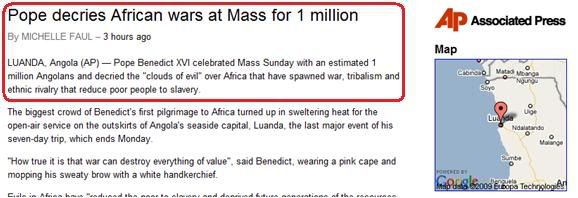
 Here's how the British newspaper The Guardian reports the Mass. Even the Pope's worst enemies can't well deny a three-hour even broadcast around the world. It's just too bad that the Vatican-TV feeds to the TV stations carrying papal coverage is always linited only to the actual event, and so until today, with the open-air Mass, the TV coverage has not really shown the magnitude and degree of the Africans' welcome for the Pope....
Here's how the British newspaper The Guardian reports the Mass. Even the Pope's worst enemies can't well deny a three-hour even broadcast around the world. It's just too bad that the Vatican-TV feeds to the TV stations carrying papal coverage is always linited only to the actual event, and so until today, with the open-air Mass, the TV coverage has not really shown the magnitude and degree of the Africans' welcome for the Pope....
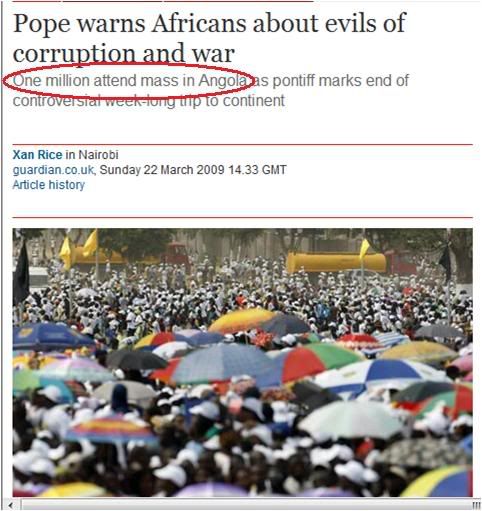
Pope Benedict XVI today decried the "clouds of evil" of war, greed and tribalism in Africa, while administering Mass for up to 1 million people in the Angolan capital, Luanda. [Another reporter/editor combo using an inappropriate word about which they could have informed themselves correctly by the simplest research - ir query to a live Catholic!]
Addressing an open-air service at the end of a seven-day trip to Africa that has attracted huge crowds and controversy [Let's be clear about it: the huge crowds are in Africa, where the trip is taking place; the controversy is off in Europe and America, where the armchair pontificators are!], the Pope urged the worshippers to continue rebuilding Angola after decades of conflict.
His message followed earlier calls for African leaders to step up their fight against corruption and poverty which have hindered the continent's development.
"Tragically, the clouds of evil have also overshadowed Africa, including this beloved nation of Angola," he said. "We think of the evil of war, the murderous fruits of tribalism and ethnic rivalry, the greed which corrupts men's hearts, enslaves the poor, and robs future generations of the resources they need to create a more equitable and just society, a society truly and authentically African in its genius and values."
Catholics make up about 55% of the Angolan population, a legacy of Portugal's colonial rule. Some of the congregation had slept on the field near a cement factory on Luanda's outskirts, to guarantee their seats.
Others left home before dawn, walking eight miles from the city centre to gather in temperatures that meant hundreds of people had to be treated for heat stroke.
Dresses, caps and T-shirts bore the image of Jesus and Benedict, who was cheered as his Mercedes "popemobile" approached the steel stage. He began his sermon by expressing sorrow at the deaths of two women in their 20s who died during a stampede on Saturday night at a football stadium where he was speaking to 30,000 young Angolans. About 40 people were injured.
At a private Mass earlier yesterday, the pope addressed several thousand worshippers, mostly from the clergy, about the perils of witchcraft.
Evangelical sects mixing traditional African beliefs and Christianity have flourished in Angola since the end of the civil war in 2002, and Benedict urged Catholics to convince people who had left the Church to return and to reach out to those believing in witches.
"So many of them are living in fear of spirits, of malign and threatening powers. In their bewilderment they even end up condemning street children and the elderly as alleged sorcerers," he said.
The week-long visit to Angola and Cameroon was the 81-year-old Pope's first trip to Africa, and he spoke today of "this great continent so filled with hope, yet so thirsty for justice, for peace".
While the reception he received locally was overwhelmingly positive [This is the important thing! Let the naysayers 'abroad' burst their spleen in and pull out their hair at the affection the Pope has received from his hosts, despite their fondest hopes otherwise], there wes strong criticism from abroad.
On Friday, the Pope chided countries that have legalised abortion, with his spokesman later clarifying he was only referring to abortion as a means of "population control". Earlier, in Cameroon [not in Cameroon - on the plane goingto Cameroon! Get a simple detail wrong, what else can you get wrong that may be more important???], the Pope angered many aid agencies and western countries when he said that condom distribution could exacerbate the AIDS problem in Africa.

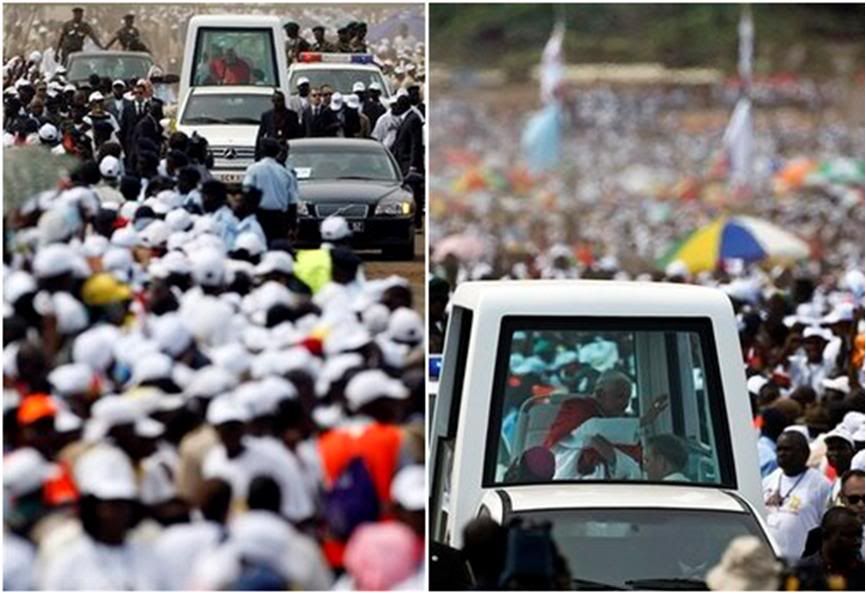
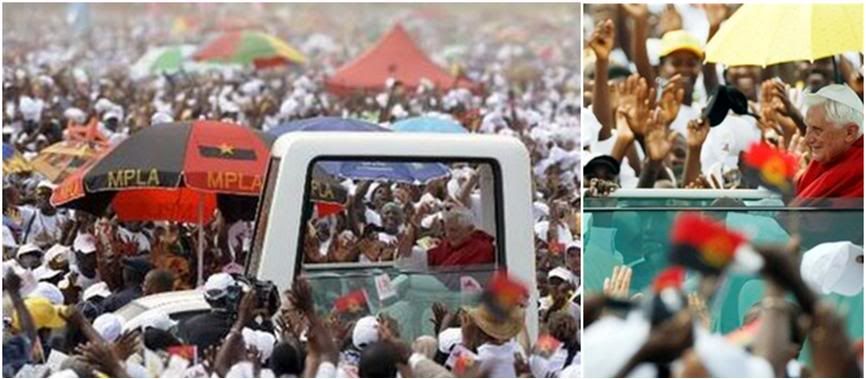
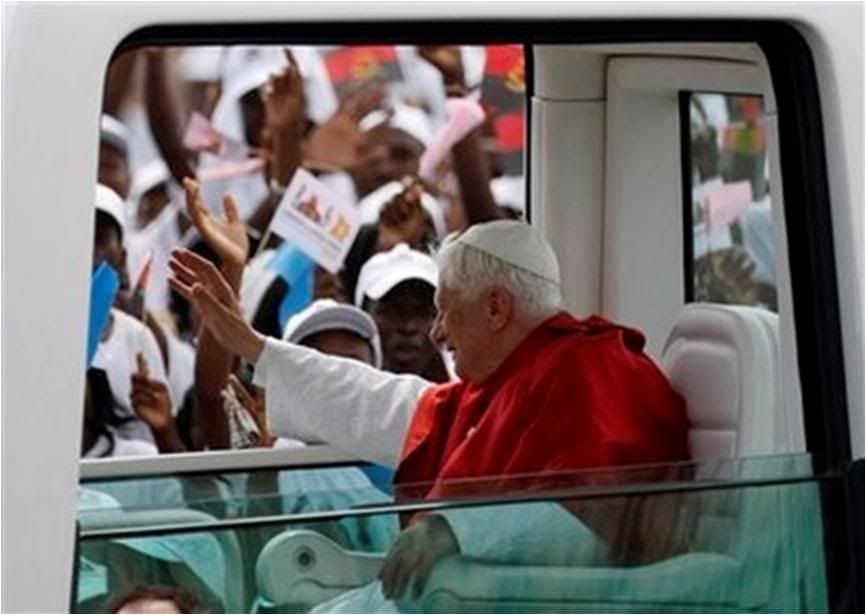
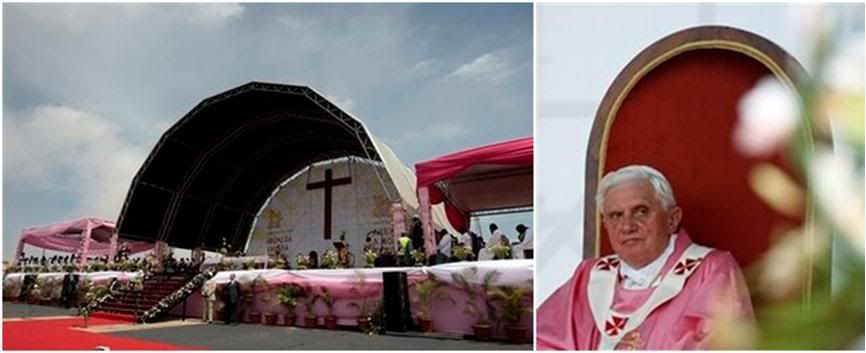
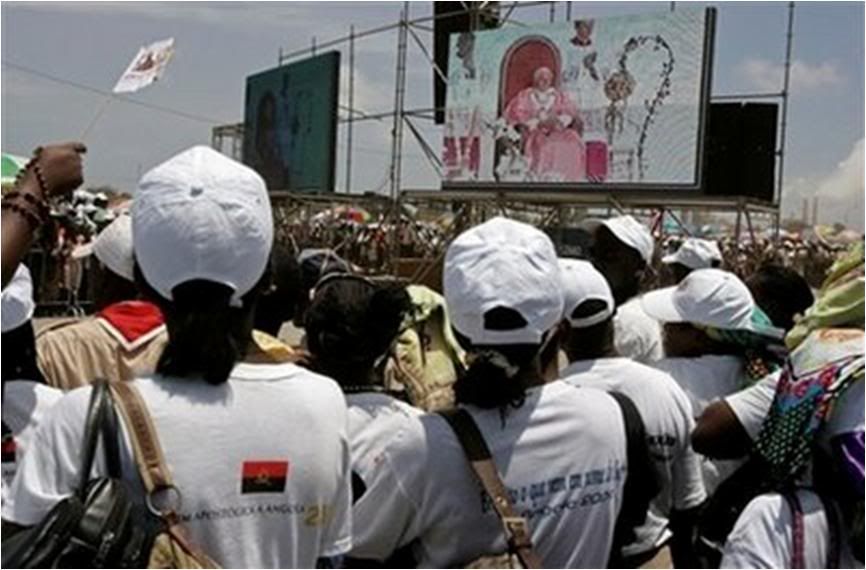
POST IN (SLOWWWWW) PROGRESS...
ABOUT CIMANGOLA FIELD
From the dossier of

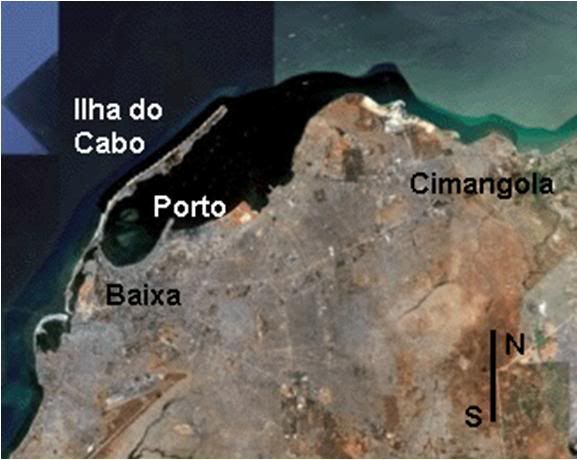 Largo da Cimangola is a vast area of open land which looks on to the Atlantic Ocean. It lies in the north of the city between cement factories and the Total Petroleum Refinery.
Largo da Cimangola is a vast area of open land which looks on to the Atlantic Ocean. It lies in the north of the city between cement factories and the Total Petroleum Refinery.
To the west of the Largo is the old city, La Baixa, which borders the Atlantic coast opposite Ilha do Cabo or Ilha do Luanda (referred to as Ilha). This island is today connected with the mainland with an artificial isthmus on which an elevated roadway has been built.
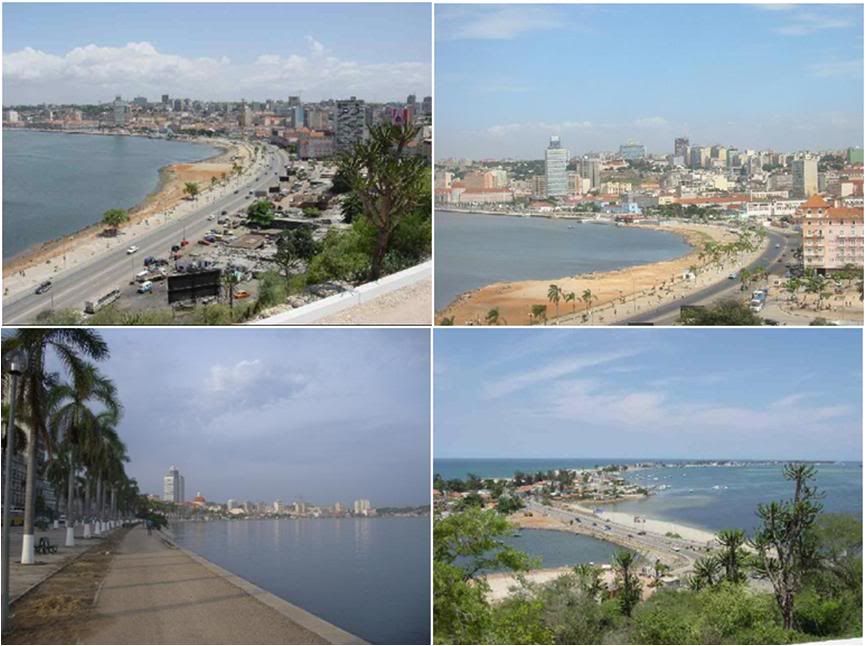
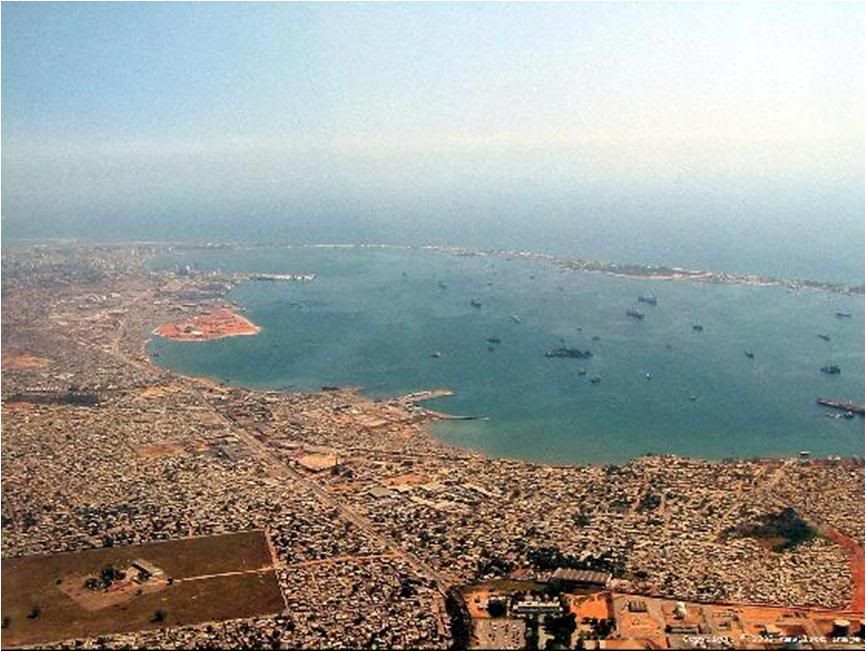
In this vast urban complex there is also the Port of Luanda, the best in the whole of southwest Africa since the island and the isthmus form a barrier which protects the maritime basin.
[Modificato da TERESA BENEDETTA 22/03/2009 21:23] |
 22/03/2009 15:00 22/03/2009 15:00 |
|
| | | OFFLINE | | Post: 16.915 | Registrato il: 28/08/2005
| Utente Gold | |
|
 HOMILY AT THE MASS IN CIMANGOLA FIELD
HOMILY AT THE MASS IN CIMANGOLA FIELD
Dear Cardinals,
Brother Bishops and Priests,
Dear Brothers and Sisters in Christ,
"God so loved the world that he gave his only Son, that whoever believes in him should not perish, but have eternal life" (Jn 3:16).
These words fill us with joy and hope, as we await the fulfillment of God's promises!
Today it is my particular joy, as the Successor of the Apostle Peter, to celebrate this Mass with you, my brothers and sisters in Christ from throughout Angola, São Tomé and Príncipe, and so many other countries.
With great affection in the Lord I greet the Catholic communities from Luanda, Bengo, Cabinda, Benguela, Huambo, Huìla, Kuàndo Kubàngo, Kunène, North Kwanza, South Kwanza, North Lunda, South Lunda, Malanje, Namibe, Moxico, Uíje and Zàire.
In a special way, I greet my brother Bishops, the members of the Inter-Regional Meeting of Bishops of Southern Africa, assembled around this altar of the Lord's sacrifice.
I thank the President of CEAST, Archbishop Damião Franklin, for his kind words of welcome, and, in the person of their Pastors, I greet all the faithful in the nations of Botswana, Lesotho, Mozambique, Namibia, South Africa, Swaziland and Zimbabwe.
Today's first reading has a particular resonance for God's people in Angola. It is a message of hope addressed to the Chosen People in the land of their Exile, a summons to return to Jerusalem to rebuild the Lord's Temple. Its vivid description of the destruction and ruin caused by war echoes the personal experience of so many people in this country amid the terrible ravages of the civil war.
How true it is that war can "destroy everything of value" (cf. 2 Chr 36:19): families, whole communities, the fruit of men's labor, the hopes which guide and sustain their lives and work!
This experience is all too familiar to Africa as a whole: the destructive power of civil strife, the descent into a maelstrom of hatred and revenge, the squandering of the efforts of generations of good people.
When God's word -- a word meant to build up individuals, communities and the whole human family -- is neglected, and when God's law is "ridiculed, despised, laughed at" (ibid., v. 16), the result can only be destruction and injustice: the abasement of our common humanity and the betrayal of our vocation to be sons and daughters of a merciful Father, brothers and sisters of his beloved Son.
So let us draw comfort from the consoling words which we have heard in the first reading! The call to return and rebuild God's Temple has a particular meaning for each of us.
Saint Paul, the two thousandth anniversary of whose birth we celebrate this year, tells us that "we are the temple of the living God" (2 Cor 6:16). God dwells, we know, in the hearts of all who put their faith in Christ, who are reborn in Baptism and are made temples of the Holy Spirit.
Even now, in the unity of the Body of Christ which is the Church, God is calling us to acknowledge the power of his presence within us, to reappropriate the gift of his love and forgiveness, and to become messengers of that merciful love within our families and communities, at school and in the workplace, in every sector of social and political life.
Here in Angola, this Sunday has been set aside as a day of prayer and sacrifice for national reconciliation. The Gospel teaches us that reconciliation, true reconciliation, can only be the fruit of conversion, a change of heart, a new way of thinking. It teaches us that only the power of God's love can change our hearts and make us triumph over the power of sin and division.
When we were "dead through our sins" (Eph 2:5), his love and mercy brought us reconciliation and new life in Christ. This is the heart of the Apostle Paul's teaching, and it is important for us to remind ourselves: only God's grace can create a new heart in us! Only his love can change our "hearts of stone" (cf. Ezek 11:19) and enable us to build up, rather than tear down. Only God can make all things new!
It is to preach this message of forgiveness, hope and new life in Christ that I have come to Africa. Three days ago, in Yaoundé, I had the joy of promulgating the Instrumentum Laboris for the Second Special Assembly for Africa of the Synod of Bishops, which will be devoted to the theme: The Church in Africa in Service to Reconciliation, Justice and Peace.
I ask you today, in union with all our brothers and sisters throughout Africa, to pray for this intention: that every Christian on this great continent will experience the healing touch of God's merciful love, and that the Church in Africa will become "for all, through the witness borne by its sons and daughters, a place of true reconciliation" (Ecclesia in Africa, 79).
Dear friends, this is the message that the Pope is bringing to you and your children. You have received power from the Holy Spirit to be the builders of a better tomorrow for your beloved country.
In Baptism you were given the Spirit in order to be heralds of God's Kingdom of truth and life, of holiness and grace, of justice, love and peace (cf. Roman Missal, Preface of Christ the King).
On the day of your Baptism you received the light of Christ. Be faithful to that gift! Be confident that the Gospel can affirm, purify and ennoble the profound human values present in your native culture and traditions: your strong families, your deep religious sense, your joyful celebration of the gift of life, your appreciation of the wisdom of the elderly and the aspirations of the young.
Be grateful, then, for the light of Christ! Be grateful for those who brought it, the generations of missionaries who contributed -- and continue to contribute -- so much to this country's human and spiritual development.
Be grateful for the witness of so many Christian parents, teachers, catechists, priests and religious, who made personal sacrifices in order to pass this precious treasure down to you! And take up the challenge which this great legacy sets before you.
Realize that the Church, in Angola and throughout Africa, is meant to be a sign before the world of that unity to which the whole human family is called, through faith in Christ the Redeemer.
The words which Jesus speaks in today's Gospel are quite striking: He tells us that God's sentence has already been pronounced upon this world (cf. Jn 3:19ff). The light has already come into the world. Yet men preferred the darkness to the light, because their deeds were evil.
How much darkness there is in so many parts of our world! Tragically, the clouds of evil have also overshadowed Africa, including this beloved nation of Angola.
We think of the evil of war, the murderous fruits of tribalism and ethnic rivalry, the greed which corrupts men's hearts, enslaves the poor, and robs future generations of the resources they need to create a more equitable and just society -- a society truly and authentically African in its genius and values.
And what of that insidious spirit of selfishness which closes individuals in upon themselves, breaks up families, and, by supplanting the great ideals of generosity and self-sacrifice, inevitably leads to hedonism, the escape into false utopias through drug use, sexual irresponsibility, the weakening of the marriage bond and the break-up of families, and the pressure to destroy innocent human life through abortion?
Yet the word of God is a word of unbounded hope. "God loved the world so much that he gave his only Son ... so that through him, the world might be saved" (Jn 3:16-17). God does not give up on us! He continues to lift our eyes to a future of hope, and he promises us the strength to accomplish it.
As Saint Paul tells us in today's second reading, God created us in Christ Jesus "to live the good life", a life of good deeds, in accordance with his will (cf. Eph 2:10).
He gave us his commandments, not as a burden, but as a source of freedom: the freedom to become men and women of wisdom, teachers of justice and peace, people who believe in others and seek their authentic good.
God created us to live in the light, and to be light for the world around us! This is what Jesus tells us in today's Gospel: "The man who lives by the truth comes out into the light, so that it may be plainly seen that what he does is done in God" (Jn 3:21).
"Live", then, "by the truth!" Radiate the light of faith, hope and love in your families and communities! Be witnesses of the holy truth that sets men and women free!
You know from bitter experience that, in comparison with the sudden, destructive fury of evil, the work of rebuilding is painfully slow and arduous. Living by the truth takes time, effort and perseverance: it has to begin in our own hearts, in the small daily sacrifices required if we are to be faithful to God's law, in the little acts by which we demonstrate that we love our neighbors, all our neighbors, regardless of race, ethnicity or language, and by our readiness to work with them to build together on foundations that will endure.
Let your parishes become communities where the light of God's truth and the power of Christ's reconciling love are not only celebrated, but proclaimed in concrete works of charity. And do not be afraid!
Even if it means being a "sign of contradiction" (Lk 2:34) in the face of hardened attitudes and a mentality that sees others as a means to be used, rather than as brothers and sisters to be loved, cherished and helped along the path of freedom, life and hope.
Let me close by addressing a special word to the young people of Angola, and to all young people throughout Africa. Dear young friends: you are the hope of your country's future, the promise of a better tomorrow!
Begin today to grow in your friendship with Jesus, who is "the way, and the truth and the life" (Jn 14:6): a friendship nurtured and deepened by humble and persevering prayer.
Seek his will for you by listening to his word daily, and by allowing his law to shape your lives and your relationships. In this way you will become wise and generous prophets of God's saving love.
Become evangelizers of your own peers, leading them by your own example to an appreciation of the beauty and truth of the Gospel, and the hope of a future shaped by the values of God's Kingdom.
The Church needs your witness! Do not be afraid to respond generously to God's call, whether it be to serve him as a priest or a religious, as a Christian parent, or in the many forms of service to others which the Church sets before you.
Dear brothers and sisters! At the end of today's first reading, Cyrus, King of Persia, inspired by God, calls the Chosen People to return to their beloved land and to rebuild the Temple of the Lord. May his words be a summons to all God's People in Angola and throughout Southern Africa: Arise! Ponde-vos a caminho! (cf. 2 Chr 36:23)
Look to the future with hope, trust in God's promises, and live in his truth. In this way, you will build something destined to endure, and leave to future generations a lasting inheritance of reconciliation, justice and peace. Amen.
THE HOLY FATHER'S ANGELUS MESSAGE
Dear Brothers and Sisters,
At the conclusion of our Eucharistic celebration, as my Pastoral Visit to Africa comes to its close, let us now turn to Mary, the Mother of the Redeemer, to implore her loving intercession upon us, our families, and our world.
In this Angelus prayer, we recall Mary’s complete "yes" to the will of God. Through Mary’s obedience of faith, the Son of God came into the world to bring us forgiveness, salvation and life in abundance.
By becoming a man like us in all things but sin, Christ taught us the dignity and worth of each member of the human family. He died for our sins, to gather us together into God’s family.
Our prayer rises today from Angola, from Africa, and embraces the whole world. May the men and women from throughout the world who join us in our prayer, turn their eyes to Africa, to this great Continent so filled with hope, yet so thirsty for justice, for peace, for a sound and integral development that can ensure a future of progress and peace for its people.
Today I commend to your prayers the work of preparation for the coming Second Special Assembly for Africa of the Synod of Bishops, scheduled to meet in October.
Inspired by faith in God and trust in Christ’s promises, may the Catholics of this Continent become ever more fully a leaven of evangelical hope for all people of good will who love Africa, who are committed to the material and spiritual advancement of its children, and the spread of freedom, prosperity, justice and solidarity in the pursuit of the common good.
May Mary, Queen of Peace, continue to guide Angola’s people in the task of national reconciliation following the devastating and inhuman experience of the civil war.
May her prayers obtain for all Angolans the grace of authentic forgiveness, respect for others, and cooperation which alone can carry forward the immense work of rebuilding.
May the Holy Mother of God, who points us to her Son, our brother, remind Christians everywhere of our duty to love our neighbour, to be peacemakers, to be the first to forgive those who have sinned against us, even as we have been forgiven.
Here in Southern Africa, let us ask our Lady in a particular way to intercede for peace, the conversion of hearts, and an end to the conflict in the neighbouring Great Lakes region.
May her Son, the Prince of Peace, bring healing to the suffering, consolation to those who mourn, and strength to all who carry forward the difficult process of dialogue, negotiation and the cessation of violence.
With this confidence, then, we now turn to Mary, our Mother, and, in reciting this Angelus prayer, let us pray for the peace and salvation of the whole human family.
After the Mas and Angelus at Cimangola Field, the Holy Fahter returned to the Apostolic Nunciature where he had lunch with the members of his delegation.

3/23/09
I must go on record that it is Monday morning, the Holy Father has left Angola, and I have just posted the above textx. But the Vatican has not yet posted the texts of the Sunday Mass Homily although since I went to bed 5 hours ago, it has posted the Angelus message which followed it, as well as his address to the women's movements on Sunday afternoon.
On their Cameroon-Angola webpage, it's worse - the last posted text - in any language - at this time is the address given to the bishops of the Special council for the Synod given Friday evening! And for some reason, Vatican Radio which has been prompt about posting all English translations as promptly as possible during the Pope's trips abroad, stopped posting them on Saturday after the Mass for the clergy.
The Vatican news services have to learn that news outlets also need to show consistency and reliability - not arbitrariness like this. It is nio way to run a news organization at all.
For instance, right now, I got the English text of the Sunday Mass homily from ZENIT. presumably from their reporter on the scene, as the various language translations of the papal texts are given out to reporters on the scene before each event.
In fact, all such translations are ready before any Papal trip abroad even begins. What is the problem then about posting them on the Vatican webpages as soon as each address is delivered? How much time and effort can it take for someone responsible to sit down at a computer and post the text? Almost nothing!
[Modificato da TERESA BENEDETTA 23/03/2009 11:33] |
 22/03/2009 17:00 22/03/2009 17:00 |
|
| | | OFFLINE | Post: 3.706 | Registrato il: 23/11/2005
| Utente Master | |
|
Definitely frustrating!
I share your annoyance, Teresa. I have been trying to post some of the American news coverage of the pope's trip to Africa over the past few days and, except for the Catholic press--mainly John Allen in the National Catholic Reporter and John Thavis of the Catholic News Service--there hasn't been anything except a rehash of criticism about the condom remark. They have stretched the condom to the point of breaking. I am really sick of reading about it. But is there anything about all the sensible remarks the pope has been making throughout Africa or any comments about or from the mobs who have come out to see him? Nooooo!
Then, yesterday and today, even the news from John Allen and John Thavis dried up. Just when the pope has been involved in two of the biggest, most colorful and newsworthy days of the trip. I guess since it is the weekend, they get the time off but you would think if they were sent to Africa to cover the trip, they could work on the weekend. So much for going the extra mile for the big story.
Thanks for posting the photos, Teresa; otherwise, we wouldn't know what was going on.
[Modificato da benefan 22/03/2009 17:01] |
 22/03/2009 17:25 22/03/2009 17:25 |
|
| | | OFFLINE | Post: 119 | Registrato il: 28/05/2007
| Utente Junior | |
|
I'm lucky enough to read/understand German. K-tv covered the entire event live, with radio vatican commentary and instant translations of all homilies. BR carried today's Mass live.
Kath.net is reporting constantly and on Kathtube ![[SM=g27811]](https://im0.freeforumzone.it/up/0/11/10151015.gif) , you can view most events, with and without commentary.
www.kathtube.org/
|
 22/03/2009 17:48 22/03/2009 17:48 |
|
| | | OFFLINE | | Post: 16.916 | Registrato il: 28/08/2005
| Utente Gold | |
|

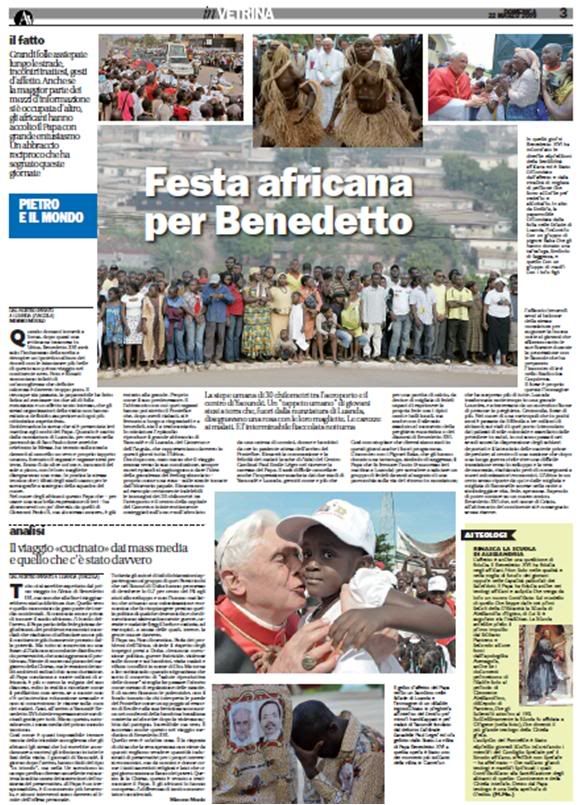 PETER AND THE WORLD:
PETER AND THE WORLD:
The Pope's African visit
as 'pre-digested' by Western media -
against what it really is
by MIMMO MUOLO
Translated from

March 22, 2009
LUANDA, Angola - Anything was possible on Benedict XVI's first trip to Africa, but not that in the end, it would end up being 'two' trips - the real one, and that 'cooked up' by most of the Western media.
And it started before the Pope had even set foot on African soil. On the plane coming to Yaounde, the Pope spoke of the joyous faith of Africans, as well as the global economic problems that threaten to worsen problems in a continent already plunged in many chronic but serious ones.
But the whole trip was soon reduced to one sentence: "AIDS cannot be solved using condoms alone, which can even increase the problem".
Absolutely nothing new as far as the teaching of the Church, but the reactions from the usual 'radical chic' opinion makers of the mainstream media were stridently harsh. [But entirely predictable whenever one sees the words Pope/Catholics paired with words like AIDS, condoms, abortion, gay marriages! Which doesn't mean the Pope and the Church should stop speaking out the truth about all such ideological hot buttons 'in deference to' all the anti-Church media-dominant elements in today's world.]
"The Pope is condemning millions of Africans to death" is more or less the vulgate and vulgar sense of their arguments. When the Pope's statements were meant to point out - the fruit of decades of experience by African countries and the Church in those countries - that condoms do little unless there is also genuine education for sexual responsibility and more focus is given to the care of AIDS victims (and to the search for an eventual cure).
Indeed, once he was in Yaounde, the Pope praised the Cameroon government's initiative of providing free AIDS medications to its AIDS victims. But of course, the Western media have not mentioned this at all.
Not to be wondered at, because neither have they really reported on the triumphal welcome which the Africans [the very same people he is supposedly 'condemning to die'] have been showing him at every step of his visit.
The newspapers of Yaounde, on the day after he arrived, all headlined the Pope's arrival 'in triumph'. But in the European Union, the headlines came from government ministries denouncing the Pope as if he were a cretin, along with the howling of all those in league with multinationals who make big business out of condoms [or more simply, those who are ideologically committed to condoms and the idea of 'sexual liberty at all costs' that they represent.]
"The Pope is irresponsible' was the kindest comment from those quarters, and some comments verged on personal insult to the Pope.
Of course, it also happens that these detractors belong to the richest nations who committed 0.7 percent of GDP as annual contribution to development aid for poorer countries (the so-called 'Doha round' commitment) but have yet to do so.
The same countries which now exercise economic colonialism of a kind tht makes the political colonialism of half a century ago seem benign.
These detractors also seem to forget that far more people die in Africa of hunger, wars and diseases other than AIDS including malaria.
But the Pope does not forget everything else to concentrate on AIDS. He speaks comprehensively of Africa's problems. He asks the rich nations to fulfill their Doha commitment. He calls for an end to the culture of corruption, to fratricidal wars, to violence against children and women. He has visited the sick, including AIDS sufferers, and he has asked Muslims once again to reject violence especially if committed 'in the name of God'.
He gets back into the news in the West only when, in an address to civilian authorities and the diplomatic corps of Angola, he denounces the pretext of so-called 'reproductive rights for women' to justify abortion as a means of birth control.
A new round of polemics, with some commentators scraping the bottom of the barrel by interpreting that sentence as an expression of the Pope's support for the Bishop of Recife (Brazil) - for his very public and indiscreet statements about excommunicating all those who had to do with teh medical abortion performed on a nine-year-old girl whose twin pregnancy (through rape by her stepfather) the doctors aborted for her wellbeing.
It sounds incredible but it's true. [It doesn't sound incredible at all! It's par for the course. The Pope's detractors will always try to paint everything about him and the Church in the worst light possible.]
But that has been the Western media account of the Pope's African trip.
The real trip is something else. It was the response of faithful Catholics who know that true hope does not come from the advocates of those who do big business by selling condoms to a captive clientele [the network of international aid organizations and movements] in great industrial bulks, but from men and women like the countless priests, religious and laymen who are by the side of the needy and the suffering every day, helping in material and spiritual ways.
This is what the Church does, and this is what the Pope has come to confirm and to bear witness to. The Africans understand this. Not the armchair commentators in the Western world.
[Modificato da TERESA BENEDETTA 22/03/2009 17:52] |
 22/03/2009 19:39 22/03/2009 19:39 |
|
| | | OFFLINE | Post: 3.707 | Registrato il: 23/11/2005
| Utente Master | |
|
Okay, I guess John Allen heard that I was griping because he wasn't writing any articles today. This one just got posted online. However, I wish he would have covered the pope's Mass this morning.
Pope extols women's rights in Africa
John Allen
National Catholic Reporter
March 22, 2009
Pope Benedict XVI delivered a strong plea for women's rights during the next-to-last day of his first trip to Africa, insisting that discrimination against women "forms no part of God's plan."
Several African women, however, said the pope's message is undercut by what they see as a pattern of discrimination inside the church itself.
The pope's comments came during an address in Luanda, the Angolan capital, to Catholic movements involved in the promotion of women. Earlier in the day, the pontiff celebrated an open-air Mass in the Angolan capital that drew a massive crowd estimated by local authorities at one million people.
"We must recognize, affirm and defend the equal dignity of man and woman," the pope said in his session with women's groups.
Benedict XVI quoted from the late John Paul II's 1995 message for the World Day of Peace, emphasizing that women have a "full right to become actively involved in all areas of public life, and this right must be affirmed and guaranteed, also, where necessary, through appropriate legislation."
"This acknowledgment of the public role of women should not detract from their unique role within the family," Benedict's quote from John Paul continued. "Here their contribution to the welfare and progress of society, even if its importance is not sufficiently appreciated, is truly incalculable."
By virtually any measure, the pope's assertion of male-female equality remains more an aspiration than a reality across much of Africa.
According to the United Nations, women are just slightly more than 50 percent of the overall population, but they represent 61 percent of all AIDS cases. The director of the Etoudi Maternity clinic in Yaoundè, the capital city of Cameroon, told NCR on Saturday that at least a quarter of all the pregnant women the clinic treats are HIV-positive, while the country's overall adult infection rate is just five percent.
Days before Benedict XVI's arrival in Africa, the United Nations released a new study asserting that 51 percent of African women have been victims of violence, 11 percent suffer violence while pregnant, 21 percent marry before the age of fifteen, and 24 percent experience genital mutilation.
In the face of those realities, Benedict XVI issued a strong call to action.
"I call everyone to an effective awareness of the adverse conditions to which many women have been -- and continue to be -- subjected," he said, "paying particular attention to ways in which the behavior and attitudes of men, who at times show a lack of sensitivity and responsibility, may be to blame."
The pope argued that the future of African families, and therefore African society, in many ways rests in the hands of women.
"History records almost exclusively the accomplishments of men, when in fact much of it is due to the determined, unrelenting and charitable action of women," he said.
"Think of all the places afflicted by great poverty or devastated by war, and of all the tragic situations resulting from migrations, forced or otherwise," the pope said. "It is almost always women who manage to preserve human dignity, to defend the family and to protect cultural and religious values."
Benedict held up two role models for African women: Teresa Gomes and Maria Bonino. Gomes was a lay woman who held her parish together during the most violent period of the Angolan civil war; Bonino was an Italian pediatrician and volunteer, who died in Angola during an epidemic and is buried in the country.
Benedict also urged men to assume their responsibilities as husbands and fathers.
"Society must hold husbands and fathers accountable for their responsibilities towards their families," he said.
Church women respond
Some African women, however, argued that the Catholic church here does not always live up to the ideals sketched by the pope.
"Women are always in second place in the church," said Pauline Maissaba, a 24-year-old Cameroonian Catholic, who spoke to NCR following Sunday Mass at Yaoundè's St. Kisito Parish, where the liturgy is celebrated in the local Ewondo language.
"When you come to church, you always see priests, deacons, and seminarians taking charge," Maissaba said. "Women clean the church, they wash the priest's clothes, and they do the cooking. They're always doing the less rewarding work."
Two African members of a women's religious order, the Servants of the Holy Heart of Mary, seemed to agree.
"The church talks about honoring the place of women, as if women are no longer left behind. But women are left behind," said Grace Atem, a 22-year-old Cameroonian who's in formation with the Holy Heart sisters.
Sr. Anastasie Bekono, who directs a vocational school for girls sponsored by the order, said their second-class status was on display during the pope's visit.
"When it comes to decision-making in the church, you won't see many women," Bekono said. "Even the pope's visit shows this. In Cameroon, the pope met the bishops, he met the Muslims, he met politicians, but he did not meet with women."
Bekono and Atem argued that if the pope were serious about promoting women in the church, he would have met a group of major superiors of women's orders, in addition to meeting the bishops of each country he visited.
Neither Bekono nor Atem said they favored the ordination of women to the priesthood. They suggested that their concern is not challenging doctrine, but rather the practical ways in which women are excluded from leadership -- for reasons, they hinted, which are less theological than sociological.
Not every African woman, however, seemed dissatisfied.
"We are all the same in the church," said Monique Enyegue, 51, of Cameroon. "There is no discrimination."
The evil of war
Earlier in the day, Benedict XVI touched on other pressing social issues, continuing what has been a remarkably outward-looking emphasis during his maiden voyage in Africa.
"Tragically, the clouds of evil have also overshadowed Africa, including this beloved nation of Angola," Benedict said during an open-air Mass in Luanda's Cimangola Square.
Among other things, the pope made his first reference on African soil to the continent's bloodiest recent conflict -- a war in the Great Lakes region that at one point involved the Democratic Republic of the Congo, Rwanda, Burundi, Uganda, Zimbabwe and Angola, and that has left an estimated five million dead and tens of millions homeless over the last decade.
Benedict prayed for "an end to the conflict in the neighboring Great Lakes region."
More generally, the pope reflected on all the wars that have scarred Africa in recent years. The U.N. estimates that of 13 million people killed in large scale conflicts from 1994 to 2003, nine million died in sub-Saharan Africa.
"We think of the evil of war, the murderous fruits of tribalism and ethnic rivalry, the greed which corrupts men's hearts, enslaves the poor, and robs future generations of the resources they need to create a more equitable and just society -- a society truly and authentically African in its genius and values," the pope said.
"What of that insidious spirit of selfishness which closes individuals in upon themselves, breaks up families, and, by supplanting the great ideals of generosity and self-sacrifice, inevitably leads to hedonism, the escape into false utopias through drug use, sexual irresponsibility, the weakening of the marriage bond and the break-up of families, and the pressure to destroy innocent human life through abortion?" the pope added.
During brief remarks after the noontime Angelus prayer, Benedict ended on an up-beat note about Africa's future.
"May the men and women from throughout the world who join us in our prayer, turn their eyes to Africa, to this great Continent so filled with hope, yet so thirsty for justice, for peace, for a sound and integral development that can ensure a future of progress and peace for its people," he said.
The pope's trip to Angola was marred by a stampede yesterday afternoon at a stadium where the pope held a massive session with Angolan youth. Two people were killed and several injured in the melee, which occurred before the pope arrived. A Vatican spokesperson described Benedict as "very upset" upon learning what had happened.
With a brief departure ceremony in Luanda tomorrow morning, Benedict wraps up his Africa swing. His next foreign journey is set for early May, when he is scheduled to travel to Israel, the Palestinian Territories, and Jordan.
|
 22/03/2009 19:43 22/03/2009 19:43 |
|
| | | OFFLINE | | Post: 16.917 | Registrato il: 28/08/2005
| Utente Gold | |
|
 Day 6 - MEETING WITH CATHOLIC
Day 6 - MEETING WITH CATHOLIC
WOMEN'S ADVOCACY GROUPS
Church of St. Anthony of Lisbon
At 4 p.m. today, the Holy Father left the Apostolic Nunciature and proceeded by car to the Parish Church of St Anthony, which is in the charge of a community of Capuchin friars, in a suburb of Luanda.
He was welcomed by the parish priest, and at 4:45, he met with the representatives of Catholic movements for the promotion of women, among them Promaica, the largest Angolan association for women'a advocacy.
The Holy Father's address was preceded by a greeting from Mons. José de Queirós Alves, C.SS.R., Archbishop of Huembo and president of the Angolan bishops' Commission for the Laity, and by two women speaking in representation of all the movements.
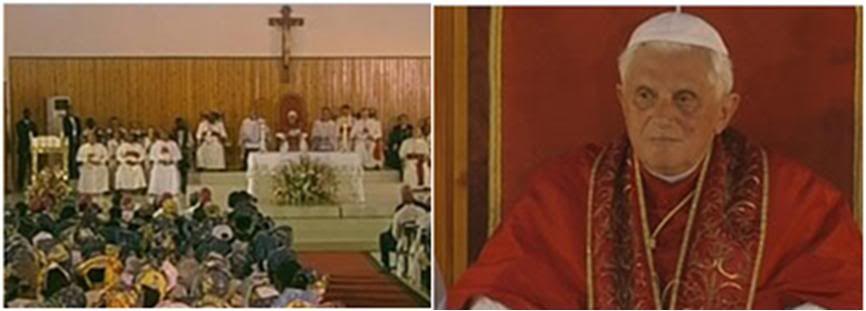
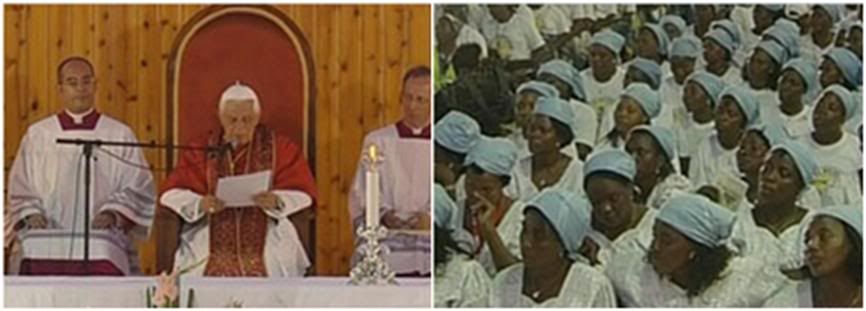

Here is the Vatican translation of the Holy Father's address.
THE HOLY FATHER'S ADDRESS
TO THE WOMEN'S MOVEMENTS
Dear Brothers and Sisters,
"They have no more wine," said Mary, begging Jesus to intervene so that the wedding-feast could continue, as was only right and fitting: "As long as the wedding guests have the bridegroom with them, they cannot fast" (Mk 2:19).
The Mother of Jesus turns to the servants and implores them: "Do whatever he tells you" (cf. Jn 2:1-5). Her maternal mediation thus made possible the "good wine", prefiguring a new covenant between divine omnipotence and the poor but receptive human heart.
This, in fact, had already happened in the past when – as we heard in the first reading – "all the people answered together and said: ‘all that the Lord has spoken, we will do’" (Ex 19:8).
These same words well up in the hearts of all gathered here today in Saint Anthony’s Church: a building which we owe to the commendable missionary efforts of the Capuchin Friars Minor, who wanted to provide a new Tent for the Ark of the Covenant, the sign of God’s presence among his pilgrim people.
To them, to those who work alongside them, and to all who benefit from their spiritual and social assistance, the Pope imparts his blessing with warm words of encouragement.
I greet with affection all those present: Bishops, priests, religious men and women, and particularly the lay faithful who consciously embrace the duties of Christian commitment and witness that flow from the Sacrament of Baptism and also – in the case of spouses – from the Sacrament of Marriage.
Moreover, given the main purpose of our gathering today, I extend greetings of great affection and hope to all women, to whom God has entrusted the wellsprings of life: I invite you to live and to put your trust in life, because the living God has put his trust in you!
With gratitude in my heart I also greet the leaders and facilitators of ecclesial movements that have made the promotion of Angolan women a priority.
I thank Archbishop José de Queirós Alves and your representatives for their kind words and for drawing attention to the aspirations and hopes of so many of the silent heroines among the women of this beloved nation.
I call everyone to an effective awareness of the adverse conditions to which many women have been – and continue to be – subjected, paying particular attention to ways in which the behaviour and attitudes of men, who at times show a lack of sensitivity and responsibility, may be to blame. This forms no part of God’s plan.
In the Scripture reading, we heard that the entire people cried out together: "all that the Lord has spoken, we will do!"
Sacred Scripture tells us that the divine Creator, looking upon all he had made, saw that something was missing: everything would have been fine if man had not been alone! How could one man by himself constitute the image and likeness of God who is one and three, God who is communion?
"It is not good that the man should be alone; I will make him a helper fit for him" (Gen 2:18). God went to work again, fashioning for the man the helper he still lacked, and endowing this helper in a privileged way by incorporating the order of love, which had seemed under-represented in creation.
As you know, my dear friends, this order of love belongs to the intimate life of God himself, the Trinitarian life, the Holy Spirit being the personal hypostasis of love.
As my predecessor Pope John Paul II once wrote, "in God's eternal plan, woman is the one in whom the order of love in the created world of persons takes first root" (Mulieris Dignitatem, 29).
In fact, gazing upon the captivating charm that radiates from woman due to the inner grace God has given her, the heart of man is enlightened and he sees himself reflected in her: "This at last is bone of my bones and flesh of my flesh" (Gen 2:23).
Woman is another "I" who shares in the same human nature. We must therefore recognize, affirm and defend the equal dignity of man and woman: they are both persons, utterly unique among all the living beings found in the world.
Man and woman are both called to live in profound communion through a reciprocal recognition of one another and the mutual gift of themselves, working together for the common good through the complementary aspects of masculinity and femininity.
Who today can fail to recognize the need to make more room for the "reasons of the heart"? In a world like ours, dominated by technology, we feel the need for this feminine complementarity, so that the human race can live in the world without completely losing its humanity.
Think of all the places afflicted by great poverty or devastated by war, and of all the tragic situations resulting from migrations, forced or otherwise. It is almost always women who manage to preserve human dignity, to defend the family and to protect cultural and religious values.
Dear brothers and sisters, history records almost exclusively the accomplishments of men, when in fact much of it is due to the determined, unrelenting and charitable action of women.
Of all the many extraordinary women, allow me to mention two in particular: Teresa Gomes and Maria Bonino. The first, an Angolan, died in 2004 in the city of Sumbe after a happily married life in which she gave birth to seven children; she was a woman of unswerving Christian faith and exemplary apostolic zeal.
This was particularly evident during the years 1975 and 1976 when fierce ideological and political propaganda invaded the parish of Our Lady of Grace of Porto Amboim, almost forcing the doors of the church to close.
Teresa then became the leader of the faithful who refused to bend under pressure. Teresa offered support, courageously protecting the parish structures and trying every possible means to restore the celebration of Mass. Her love for the Church made her indefatigable in the work of evangelization, under the direction of the priests.
Maria Bonino was an Italian paediatrician who offered her expertise as a volunteer in several missions throughout this beloved African continent. She became the head of the paediatric ward in the provincial hospital at Uíje during the last two years of her life.
Caring for the daily needs of thousands of children who were patients there, Maria paid the ultimate price for her service by sacrificing her life during the terrible epidemic of Marburg Haemorrhagic Fever, to which she herself succumbed.
She was transferred to Luanda for treatment, but she died and was laid to rest here on 24 March 2005 – the day after tomorrow is her fourth anniversary.
Church and society have been – and continue to be – enormously enriched by the presence and virtues of women, and in a particular way by consecrated religious who, relying on the Lord’s grace, have placed themselves at the service of others.
Dear Angolans, since the dignity of women is equal to that of men, no one today should doubt that women have "a full right to become actively involved in all areas of public life, and this right must be affirmed and guaranteed, also, where necessary, through appropriate legislation.
This acknowledgment of the public role of women should not however detract from their unique role within the family. Here their contribution to the welfare and progress of society, even if its importance is not sufficiently appreciated, is truly incalculable" (Message for the 1995 World Day of Peace, 9).
Moreover, a woman’s personal sense of dignity is not primarily the result of juridically defined rights, but rather the direct consequence of the material and spiritual care she receives in the bosom of the family.
The presence of a mother within the family is so important for the stability and growth of this fundamental cell of society, that it should be recognized, commended and supported in every possible way.
For the same reason, society must hold husbands and fathers accountable for their responsibilities towards their families.
Dear families, you have undoubtedly noticed that no human couple, alone and on its own strength, can adequately offer children love and a genuine understanding of life.
In fact, in order to say to someone, "your life is good even though you don’t know what the future will bring", there needs to be a higher and more trustworthy authority than parents alone can offer.
Christians know that this higher authority has been given to the larger family which God, through his Son Jesus Christ and the gift of the Holy Spirit, has established within human history, namely the Church.
We find at work here the eternal and indestructible love which guarantees to each of us that our life will always have meaning, even if we do not know what the future will bring.
For this reason, the building up of every Christian family takes place within the larger family, the Church, which sustains the domestic family and holds it close to her heart, giving it the assurance that it is protected, now and in the future, by the "yes" of the Creator.
"They have no more wine" – Mary says to Jesus. Dear women of Angola, accept Mary as your advocate with the Lord. This is precisely how we see her at the wedding-feast of Cana: a tender woman, full of motherly care and courage, a woman who recognizes the needs of others and, wanting to help, places those needs before the Lord.
If we stay close to her, we can all – men and women alike – recover that sense of serenity and deep trust that makes us feel blessed by God and undaunted in our struggle for life.
May Our Lady of Muxima be the guiding star of your lives. May she keep all of you united in the great family of God. Amen.
After the address, the women offered the Holy Father gifts characteristic of their respective occupations.
He then to the Nuciature, where he dined in private.
 The social situation of women in Angola is appalling. No wonder the Pope held this special meeting!
Women and the family in Angola
From the dossier of
The social situation of women in Angola is appalling. No wonder the Pope held this special meeting!
Women and the family in Angola
From the dossier of

Both for the Church and for the government, Angola has a woman-family emergency.
War left between 60% and 70% of the people, particularly women and children, living below the poverty line.
In Angola 27% of girls and 32% of boys attend elementary school. Only 40% of the women have a regular job in public or private sectors, while 60% are employed illegally and paid a pittance.
"The Ministry for the Family and the Promotion of Women was created," the President of Angola said a few weeks ago explaining the reasons for an official delegation to the 6th World Meeting of Families in Mexico, "to combat these scourges."
And these 'scourges' are not easily overcome when the prevailing culture does not foster healthy emancipation of women, although the government has endorsed International Conventions to combat discrimination against women, including the Declaration of the Rights of Women and Children.
The difficult and precarious living conditions of most Angolan women also affect those who enter illegally from other countries, especially in northern Angola, to work in diamond mines.
Several international organisations, such as Doctors without Borders, have denounced sexual violence against women arrested in view of expulsion to the Democratic Republic of Congo.
As the Archbishop of Luanda recalled on 16 January 2007, the local Church donates over 300,000 dollars a year to help fight poverty and to increase instruction and formation of women and children. In this field, church and government structures work together.
Of course, the family and traditional family values are threatened not only by precarious living conditions, but also by an invasion ofd dangerous cultural paradigms through television, which introduces lifestyles considered 'modern and liberal', but which rea;;y rarget Angolans only as 'consumers'.
The presence of women in institutions has increased in recent years but is still very small. In the framework of the last elections. a new registration campaign was launched in refugee camps on the outskirts of cities in border zones, but many Angolans, especially women, still have no identity papers. In practice, it means that they do not 'exist' as citizens and therefore cannot claim any rights.
[Modificato da TERESA BENEDETTA 23/03/2009 11:26] |
 22/03/2009 19:43 22/03/2009 19:43 |
|
| | | OFFLINE | Post: 3.708 | Registrato il: 23/11/2005
| Utente Master | |
|
And here is a belated story about the pope's meeting with young people on Saturday when two of them were killed in a stampede to get inside.
Pope asks Angolan youths to shape the future according to the Gospel
By John Thavis
Catholic News Service
March 22, 2009
LUANDA, Angola (CNS) -- Meeting with nearly 30,000 Angolan young people, Pope Benedict XVI urged them to be wary of today's dominant social culture and to shape the world according to the values of the Gospel.
The encounter in a Luanda soccer stadium March 21 was marred by a stampede that killed two young women and injured 89 others, hours before the pope arrived. The pope was informed of the tragedy later that evening and he expressed his condolences at a Mass the next day.
Participants at the rally did not learn until afterward of the deaths, and the festive encounter went on as scheduled. It had a little bit of everything: native dance and song, testimonials from young Catholics, conga ensembles and, above all, tons of enthusiasm among the participants.
The focus of the pope's talk was a simple lesson on how to live the good life.
"My young friends, you hold within yourselves the power to shape the future," he said. But it won't happen without an encounter with God, he said.
"The dominant social culture is not helping you to live by Jesus' word or to practice the self-giving to which he calls you in accordance with the Father's plan," he said.
Instead, he said, they need to build their lives around the renewal that begins with a personal encounter with Christ. That's especially important when it comes time to make decisions that involve a lifelong commitment, like marriage, that can seem to represent a loss of freedom, he said.
"These are the doubts you feel, and today's individualistic and hedonistic culture aggravates them," he said. But he urged them to find inspiration in their faith.
"Life is worthwhile only if you take courage and are ready for adventure, if you trust in the Lord who will never abandon you," he said.
The pope also greeted a group of young people who were left orphaned or disabled by Angola's 27-year civil war, and said he could imagine the conflict's devastating effects on all the country's young people.
"I think of the countless tears that have been shed for the loss of your relatives and friends. It is not hard to imagine the dark clouds that still veil the horizon of your fondest hopes and dreams," he said.
The pope spoke from beneath a large yellow tent in Coqueiros Stadium, under a hot late afternoon sun. He looked uncomfortable in the heat, and several youths who had spent hours awaiting his arrival suffered heat exhaustion and had to be taken away by stretcher.
The 81-year-old pontiff watched costumed dancers kick up a storm as a conga group pounded out the rhythm, their long yellow wigs shaking to the beat. Then a group of barefoot young women performed a hip-thrusting dance on the grass in front of the papal platform.
In the stands, youths held up pieces of colored cardboard in synchronized patterns, spelling out "God is love" and depicting the pope's own smiling face.
Several young Angolans spoke about their own spiritual paths and experiences, including detours into drugs and alcohol use, discouragement and loneliness. One of them told how he was welcomed into the church after a life of stealing and addiction, and later became a priest.
One young woman, Elsa Montenegro, said that even those active in the church don't have an easy time putting the faith into action. The challenges, she said, are many and can seem overwhelming: unemployment, corruption, drug use, prostitution, AIDS, abortion and dishonesty.
"Holy Father, we are asking you to enlighten us, help us, advise us, orient us," she said.
After delivering his talk, the pope greeted many of the performers individually. A final, haunting song was sung directly in front of the pope by a young man in a wheelchair. The pope embraced him warmly after the performance.
The young people presented the pope with several gifts, including a carved ebony statue of a gazelle and a wood-and-gourd balafon, the xylophonelike instrument popular throughout Africa.
The encounter was broadcast live throughout Angola, and organizers considered it one of the most important events of the papal visit. About half of Angola population is under age 15, and church leaders said many are deeply worried about their future.
The stampede occurred when authorities opened the gates of the stadium about four hours before the pope's arrival. The two women, both 20 years old, died after being taken to a hospital, and news of the tragedy was made public late in the evening.
At an outdoor Mass the next day, the pope prayed for the victims, their families and the injured. Cardinal Tarcisio Bertone, Vatican secretary of state, visited relatives one of the victims at a Luanda hospital March 22, expressing the pope's sympathies. The woman, named Celine, was a catechist at a Luanda parish who had held her last lesson the morning of her death. At the time, the other victim had not been identified.
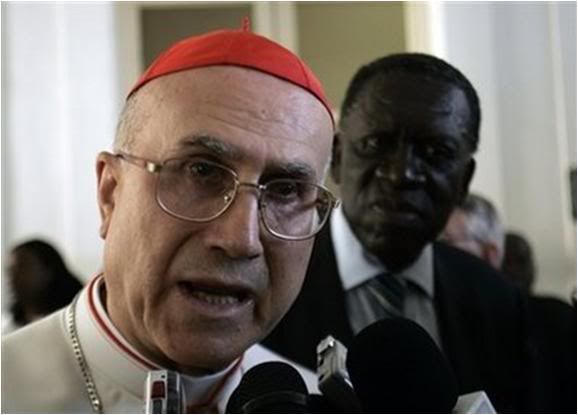 The story-caption on the AP photo reads
The story-caption on the AP photo reads:
Cardinal Tarcisio Bertone, left, addresses the media as Angolan Foreign Affairs Minister Assuncao Does Anjos, right, looks on at the hospital in Luanda, Angola, Sunday March 22, 2009.
Before he said Mass on Sunday, Pope Benedict offered his condolences to the families of two 20-year-old women trampled to death in a stampede at a Luanda stadium before a youth event he addressed on Saturday. He also wished a speedy recovery to some 40 people injured in the crush.
Later, the Vatican's No. 2 official, Cardinal Tarcisio Bertone, blessed the bodies of the two victims, laid out under white sheets at Josina Machel Hospital in Luanda.(AP)
[Modificato da TERESA BENEDETTA 22/03/2009 20:01] |
 22/03/2009 19:48 22/03/2009 19:48 |
|
| | | OFFLINE | | Post: 16.918 | Registrato il: 28/08/2005
| Utente Gold | |
|
 Ugandan AIDS activist thanks Pope
Ugandan AIDS activist thanks Pope
for statement on condoms:
"When you look at many of these so-called AIDS activists,
they are simply in it for the money"
By Hilary White

ROME, March 20, 2009 (LifeSiteNews.com) - A prominent Ugandan AIDS activist says that those who are attacking the Pope for his stand against the use of condoms in the fight against the disease have "no credibility."
In an e-mail sent to LifeSiteNews.com today, Ssempa thanked Pope Benedict for saying that condoms can exacerbate the problem of HIV/AIDS.
Ssempa co-authored Uganda's successful policy with Dr. Edward Green of Harvard University's Center for Population and Development Studies. Dr. Green told the National Review Online this week that Pope Benedict's assertion that condoms only make the AIDS crisis worse is backed by the research.
"There is," Green said, "a consistent association shown by our best studies, including the U.S.-funded 'Demographic Health Surveys,' between greater availability and use of condoms and higher (not lower) HIV-infection rates."
After twenty years as an AIDS prevention activist in Uganda, Martin Ssempa says he has concluded that the real culprit in the spread of the disease "is sexual promiscuity driven by immorality of the heart."
Ssempa, a pastor and government consultant on AIDS prevention, told LifeSiteNews.com, "It is a complete lie for many to say that Uganda has succeeded by a major condom campaign."
Earlier this week, at the start of his trip to Africa, Pope Benedict told reporters that the solution to the AIDS problem is "a spiritual and human renewal bringing a new way of behaving towards one another."
Condemnation by the world's media, and the international AIDS and homosexualist organisations, exploded when the pope said, "If the soul is lacking, if Africans do not help one another, the scourge cannot be resolved by distributing condoms; quite the contrary, we risk worsening the problem."
Ssempa told LifeSiteNews.com today that he believes the Pope was right. Ssempa has long maintained that this kind of attack on the Pope and the Catholic Church's position, that occurs regularly in the press, stems from the hatred and fear in the "AIDS industry" of traditional morality in general and of sexual continence in particular.
"Here in Uganda when AIDS came, we did not think it was caused by lack of condoms. No, it was due to promiscuity. What the Pope is saying is true. However, it makes those who are determined to live in a life of promiscuity feel spotlighted," Ssempa said.
Martin Ssempa has spent nearly two decades on the frontline of Uganda's highly successful AIDS prevention program that focuses on encouraging sexual abstinence and fidelity in marriage.
"Our successful policy," he said, "always put abstinence and being faithful ahead of any medical products such as condoms and testing."
He questioned the failure of most media outlets to investigate the motives of the international AIDS organisations, saying, "Many of these writers and naysayers, are actually shills in the service of big pharma.
"Many are entangled in lucrative deals to distribute condoms and the more condoms they push, the more money they get. How come no one has ever made a comment on how much money is being made by big pharma out of the whole condom, testing and drug business?
"In fact when you look at many of these so-called AIDS activists, they are simply in it for the money," he added.
Uganda's population is mainly Christian, and the message, supported by government-sponsored promotion, that men and women should not engage in extra-marital sex dramatically reduced Uganda's AIDS rate over the last couple decades.
Ssempa and other local AIDS activists have frequently decried the interference of US and Europe-based international organizations who reject abstinence and fidelity principles in favor of condoms. This, they say only encourages promiscuity and the spread of the deadly disease.
Since the intervention of the international AIDS groups, with their emphasis on condoms and downplaying of abstinence, Uganda's AIDS rate has begun, according to local experts, to "tick back up."
Ssempa warned that there is no security in using condoms to protect against the AIDS virus. "Those who believe that they can put all their trust in getting a perfect condom in Africa are totally out of sync with the realities of Africa.
"In 2004 August more than 40 million condoms of the Engabu brand were found to be defective and were recalled to be destroyed. This was after a huge public outcry on the condom failures which may have exposed many people to HIV/AIDS in the false hope of security from these latex from China."
Ssempa said that there needs to be a complete rethinking of the reliance on condoms. Citing Dr. Green's work at Harvard, he said, "We must ask the tough question, why do the nations in Africa with the highest condoms correspond with the highest HIV/AIDS rates? These include Botswana and South Africa who have the highest condoms per male ratio, yet their numbers of HIV/AIDS have not gone down.
"They are in the top three spots of the nations with the highest HIV/AIDS. On the other hand nations with lower condoms per male per year correspond with lower HIV/AIDS."
|
 22/03/2009 19:53 22/03/2009 19:53 |
|
| | | OFFLINE | Post: 3.709 | Registrato il: 23/11/2005
| Utente Master | |
|
My gosh, condom wars have begun.
11 arrested near Paris' Notre Dame in condom clash
The Associated Press
Published: March 22, 2009
PARIS: Police say they arrested 11 people after a clash between youths and leftist activists giving away condoms in front of Notre Dame Cathedral in Paris.
Police say the skirmish broke out after environmentalists and Communist Party activists staged a morning protest on the square in front of the cathedral against recent comments by Pope Benedict XVI over condom use.
Police say about 20 "right-wing" youths shouting "Lay off my pope" clashed with the activists after Mass on Sunday.
The pope drew criticism from some Western governments for saying last week during a flight to Africa that condoms were not the answer to the continent's AIDS epidemic, suggesting that sexual behavior was the issue.
*********
Pope protesters, supporters clash in France
Sun Mar 22, 2009 8:31pm IST
PARIS (Reuters) - Far-right youths clashed with left-wing activists who had gathered outside Notre-Dame Cathedral in Paris on Sunday to protest against Pope Benedict's opposition to condoms, a police source said.
About 30 ecologists and Communists threw condoms on the ground outside the cathedral, where worshippers were leaving Sunday mass.
One person was injured and three were arrested after clashes between the protesters and about 20 youths who the police source said were associated with the far-right and who were carrying placards saying "Leave my Pope alone".
Benedict said in Africa on Tuesday that the use of condoms was complicating the fight against AIDS, reaffirming the Roman Catholic Church's opposition to condoms.
The comments were criticised by French politicians from all parties.
Two surveys at the weekend showed the German-born pontiff's popularity in France has fallen sharply.
A CSA poll for Le Parisien said 57 percent had a bad opinion of Benedict compared to only 32 percent in September 2008. A separate IFOP poll for the Journal du Dimanche newspaper found 43 percent of French Catholics want him to leave.
The pope's comments came ahead of an AIDS action weekend in France. AIDS-awareness activists Act Up-Paris also organised a "die-in" outside Notre-Dame on Sunday. They carried portraits of the pontiff accompanied by the slogan "Benoit XVI Assasin."
"By refusing to allow the promotion of condoms, the Catholic Church has millions of deaths on its conscience," Act Up-Paris said in a statement.
Human Rights Minister Rama Yade said she was "dumbfounded" by the pope's comments. Foreign Minister Bernard Kouchner called them "the opposite of tolerance and understanding".
France is traditionally a Catholic country, although less than 10 percent of the population attend Sunday mass. But about 200,000 people turned out for an open-air service in Paris last year when the pope visited the country.
I'll bet the kids were not "far right" but just normal kids disgusted with having their pope, religion, and fellow church goers insulted.
 Things are even worse than that in France right now. Look at this report and the preposterous presumption it implies!
Many French want the Pope out
Things are even worse than that in France right now. Look at this report and the preposterous presumption it implies!
Many French want the Pope out
Paris, March 21 (AFP) - More than four in 10 French Catholics want the Pope to step down and most want the church to change its stance on abortion, divorce and homosexuality, according to a poll to be published on Sunday.
[What do this people think the Papacy is - like a Prime Minisership in a parliamentary government that's dependent on the mood of the moment? That the position=-holder has to step down if there is enough opposition?]
Some 43% of Catholics want Pope Benedict XVI to resign or retire, compared to 54% who do not, according to an IFOP poll to be published in France's Le Journal du Dimanche weekly.
The poll was conducted over telephone on Thursday and Friday and involved 620 Catholics spread over France, aged 18 or above.
Sentiments against Benedict are higher among non-practising Catholics, with 47% wanting the Pope out of office, according to the survey, while only about a third of practising Catholics do. [So they're non-practising. What do they care then what happens in the Church? It is not as if they would come back to being practising orthodox Catholics if there wre a different Pope! As the traditionalist boys at Notre Dame said, "Lay off my Pope!" TOUCHEZ PAS MON PAPE!]
Meanwhile, more than 80% of Catholics polled want the Church to modify its position on contraception and abortion, while significant majorities also want it to change its opposition to remarriage after divorce as well as homosexuality.
[I suppose that leaves the Catholics who attended the Papal Masses in Paris and Lourdes last September as the only 'genuine' practising Catholics in France - a million all told? And from their banners, many of them were from traditionalist groups!]
Moreover, almost half consider Benedict does a bad job defending the values of Catholicism, according to the IFOP poll - a sharp increase from 13% who judged so in a separate survey last August for La Vie magazine.
[The 'bad job' depends on whether you are reading what the Pope himself says and writes, or you're merely depending on what the media tells you about what he says and writes!
Besides, people who don't even lift a finger or say one word to defend Church teaching in public have no business criticizing anyone who has the courage to do so. Let alone a Pope. Let alone a Pope like Benedict XVI. Is there a better apologetician [defender of the faith] right now?]
The conservative Pontiff has faced a rash of criticism in recent months, notably over his decision to lift the excommunication of a Holocaust denying bishop.
Benedict's remarks on condoms and abortion during his current visit to Africa have generated fresh outcry.
The Vatican sought to soften the reaction on Saturday, saying the Church did not oppose medical care for mothers that results in the unintentional death of the foetus.
**********************************************************************
They had to do something to neutralize the triumph of the Pope's African trip, at least in France (where many might have followed the trip to Cameroon closely, because that was once a French colony). and hit on it, "AHA! Let's do a quick survey and trump the triumph!"
Well, not quite perhaps! Is it significant that despite the hostility drummed up by remarks such as those made by an ex Prime Minister (the one who said "This Pope is becoming a real trouble" - for the liberals and ultras, yes!), the ratio against the Pope is 4 to 6 and not the other way around???
P.S. BTW, the dispute over Mons. Rino Fisichella's rather equivocal stand on the Brazilian abortion is something that may become larger than it already is - and aftaer this trip is over, the Forum needs a good updating on the issue.
The Brazilian bishops, who have explained the circumstances of the entire episode, find it strange that the president of the Pontifical Academy for Life should have expressed himself the way he did in a front-page OR commentary without first ascertaining all the data about the episode. They are correct that he should at least have had the courtesy to speak to the Bishop of Recife first before shooting from the hip as he did - with incomplete information.
[Modificato da TERESA BENEDETTA 22/03/2009 20:38] |
|
|
|
|